#dr daniel schreber
Explore tagged Tumblr posts
Text

So I've tried everything but the original post of this art just won't show up in the tags and it's driving me crazy. So I'm reposting. I'll leave the original up as I've got some lovely comments on it. Hopefully this works this time🤞
67 notes
·
View notes
Text
By: Bernard Lane
Published: Mar 25, 2024
Not good medicine
The dominant “gender-affirming” treatment approach—which promotes puberty blockers, cross-sex hormones and mastectomy for minors—is “fundamentally incompatible with competent, ethical medical practice.”
That is the conclusion of a new paper by academic psychiatrist Andrew Amos in the journal Australasian Psychiatry.
Dr Amos says treatment guidelines from the World Professional Association for Transgender Health (WPATH) and the Royal Children’s Hospital Melbourne (RCH) “assert without evidence that pathology plays no part in the development of gender diversity,” which is said to be part of nature.
“If it is admitted there are some pathological causes of gender diversity, then it becomes necessary to assess the health or illness of all presentations [of gender identity],” Dr Amos says.
But the gender-affirming model insists that self-declared gender identity be affirmed, not interrogated for underlying mental illness.
“The emergence of non-binary and fluid genders means there are no boundaries to self-reported gender identity, which may include a gender consistent with one of the two biological sexes; a combination of features consistent with both sexes; the absence of features of gender; an identity as a voluntarily/involuntarily castrated eunuch; or arbitrary and rapidly changing variations,” Dr Amos says.
“From a psychiatric perspective, the proposition that psychopathology plays no role in gender diversity is absurd.
“The most detailed personal description of the experiences of psychosis is that of Daniel Paul Schreber, a German judge who minutely described his belief that God had turned him into a woman and was sending ribbons from the sun through his body to impregnate him and repopulate the earth.
“It is difficult to imagine a more pathological aetiology [or cause] for gender diversity, yet the [gender-affirming model] provides no framework for assessing such a patient, and does not view Schreber’s case as an absolute contraindication to social, medical or surgical transition.
“As Schreber illustrates, it is certain that pathology causes some cases of gender diversity. Differentiating between healthy and pathological gender diversity, or, more likely, gauging the relative contribution of healthy and pathological processes originating within or in the environment of each patient, can only be achieved by the comparison of an individual’s patterns of behaviour with patterns of normal and pathological development.
“While [gender-affirming] advocates have argued transition is safe in patients with psychosis because it is easy to differentiate psychotic from non-psychotic aetiologies of gender diversity, they have provided no guidance on how to do so, and no empirical evidence that it is safe to try.
“To the extent they discuss the role of psychosis or severe personality pathology in the development of gender diversity at all, it is only to deny that either might prevent transition.”
RCH Melbourne’s treatment guideline—promoted as “Australian standards of care”1 and used by children’s hospital gender clinics across the country—states that psychosis in a minor “should not necessarily prevent medical transition.” It does not explain how to discern those cases when psychosis should indeed rule out transition.
In the leaked WPATH Files, clinicians were revealed debating how to manage “trans clients” with dissociative identity disorder (multiple personalities or alters) in which “not all the alters have the same gender identity.”
Dr Amos argues that gender-affirming treatment guidelines “abandon the clinical discipline of diagnosis and make treatment contingent upon the unconstrained subjective experiences of children and potentially disturbed adults.”
“This is unethical, because modern medicine relies upon accurate diagnosis and evidence-based clinical reasoning to ensure that treatment is likely to help and not harm patients.”
Dr Amos notes tension in the 2023 gender dysphoria policy of the Royal Australian and New Zealand College of Psychiatrists between a traditional mental health approach and the unevidenced assertion that, “Being trans or gender diverse does not represent a mental health condition.” This policy area has occasioned sharp divisions within the college since 2019.
“Although it is clear that this [2023 policy] compromise balances the concerns of different stakeholders, the medico-legal implications for psychiatrists and their patients may be too important to long defer a conclusive position on the aetiological role of mental illness in gender diversity,” Dr Amos says.
He points out that the lack of evidence for the gender-affirming model has led an Australian medical defence fund, MDA National, to restrict coverage for private practitioners facing claims because of their involvement in the medical transition of under-18 patients.
youtube
[ Video: England’s NHS has radically restricted puberty blocker drugs, but it’s business as usual for Australia’s gender medicine lobby ]
“A patient should be more than a number, but detransitioners [who regret gender medicine treatments] can’t even get that. Reclaiming one’s biological gender after a gender transition is so taboo, that there is no way to document it in a medical record with an official diagnosis code.”—FAIR in Medicine fellow Aida Cerundolo, opinion article, The Hill, 15 February 2024
“International Classification of Disease diagnosis codes label patients’ medical issues and electronically shuttle them through the US healthcare system. These letter-number combinations facilitate communication, help prevent medical errors and signal insurance companies to reimburse for treatments.
“Codes exist for patients ‘struck by orca, initial encounter,’ or who have ‘problems in relationship with in-laws’ and even for those ‘sucked into [a] jet engine, sequela.’ However, detransition remains an unrecognized medical entity because it has no corresponding diagnosis code.”
Taking cover
On May 9 last year, GCN reported that MDA National planned to restrict cover for private doctors assessing minors as eligible for medicalised gender change or initiating cross-sex hormones for them.
The insurer cited “the high risk of claims arising from irreversible treatments provided to those who medically and surgically transition as children and adolescents.”
The news appears to have alarmed the lobby group LGBTIQ Health Australia (LHA)2, whose access to federal Health Minister Mark Butler produced an “URGENT one day turnaround” brief from his department on the issue, according to documents obtained under Freedom of Information law.
These documents suggest Australia’s federal government is focused not on the international debate about safety concerns and the lack of evidence for youth gender medicine, but on expanding access to gender-affirming treatment as requested by well-connected LGBTQ lobbies.
On May 23, LHA chief executive Nicky Bath—who sits on the government’s LGBTIQA+ Health and Wellbeing 10 Year National Action Plan Expert Advisory Group—alerted Mr Butler’s office to MDA’s proposed restriction of insurance cover. (By market share, MDA is the second largest medical defence fund.)
That same day, the Department of Health and Aged Care3 secured a detailed account from MDA chief executive Ian Anderson of the insurer’s rationale for the change to take effect from 1 July 2023.
In its urgent brief sent to Minister Butler on May 30, the department relayed Mr Anderson’s explanation that—
While MDA itself had not received any claims arising from gender medicine, the insurer was aware of claims emerging with other indemnifiers in Australia and overseas
Members of MDA had expressed concerns about growing demand pressuring general practitioners (GPs or primary care doctors) to prescribe cross-sex hormones for minors
Those concerns included whether the usual consent would be sufficient for children, given the life-changing, permanent effects of such treatment; and reliance on medical opinion influencing that treatment decision in the event of a claim brought by a former patient
For these reasons, MDA had investigated the underwriting risk of claims arising from gender treatment of minors and concluded that it was unable to quantify and price the risk, quantum and frequency of claims; nor was it able to source appropriate data
MDA members with experience in gender medicine had stated their view that the best model for assessment and treatment of gender-distressed children involved a multi-disciplinary team backed by “a significant hospital”
In its brief, the minister’s department makes no reference to systematic reviews overseas showing the evidence base for paediatric transition to be very weak and uncertain.
However, the note suggests that if the regulatory Medical Board of Australia had to intervene in a case involving gender treatment of a minor, it would use the treatment guideline issued in 2018 by the gender-affirming clinic at the Royal Children’s Hospital Melbourne (RCH) and badged as “Australian standards of care.”
“In determining what is safe clinical care and what is the best available evidence, doctors should have regard to relevant Australian standards of care,” the briefing note says.
There is no hint of the controversial status of the RCH treatment guideline.
The department’s note says the RCH guideline “clearly outlines the role of GPs in the assessment and care of adolescents with gender dysphoria”, which the note says includes prescription of puberty blockers or cross-sex hormones “in collaboration with a paediatrician, adolescent physician or paediatric endocrinologist.”
However, towards the end of 2023, the RCH gender clinic changed precisely this section of the guideline consistent with a campaign by the gender-affirming lobby to ramp up GP provision of cross-sex hormone treatment for minors—the very issue that MDA was concerned about.
Gender-affirming clinicians see the mainstreaming of hormones through local medical practices as one answer to long waiting lists at children’s hospital specialist gender clinics, where older adolescents may age out before treatment.
The current, version 1.4 of the RCH guideline still says a multidisciplinary approach is “the optimal model of care” but adds new advice that, “GPs with sufficient expertise and skill in initiating and monitoring [cross-sex] hormone therapy can consider initiating and optimising hormone therapy for [minors].”
“This would typically be within a primary care-led multidisciplinary team tailored to the patient’s needs and availability of services…” (Emphasis added.)
It is not explained how GPs will know when they can go ahead without a multi-disciplinary team. Version 1.3—still available on the RCH website—did not recommend that GPs initiate cross-sex hormones without the precaution of specialist back up.
In November 2023, gender-affirming GPs keen to mainstream hormones for 16- and 17-year-olds without specialist back up complained of mixed messages as to whether or not they would be covered for this4 by the country’s largest medical defence fund, Avant.
Avant, which is understood to be defending psychiatrist Dr Patrick Toohey against a 2022 claim by detransitioner Jay Langadinos, told GCN it had not changed its cover. The fund did not answer the question whether it would cover claims arising from GP members initiating opposite-sex hormones for 16- or 17-year-old patients without the backing of a multi-disciplinary team.
Version 1.4 of the RCH guideline did not cite any new evidence supporting the practice of GP-led hormones, nor was the opportunity taken to cite fresh data reported since the guideline was first issued in 2018.
The RCH document makes no reference to systematic evidence reviews in Finland, Sweden and England since 2019. These reviews, undertaken independently, found the evidence base for hormonal treatment of minors to be very weak and uncertain.
==
"Gender affirming care" is pseudoscientific faith-healing quackery.
#Bernard Lane#Claire Chandler#puberty blockers#medical scandal#medical corruption#medical malpractice#queer theory#gender ideology#gender identity ideology#intersectional feminism#gender affirming care#gender affirming healthcare#gender lobotomy#gender affirmation#wrong sex hormones#cross sex hormones#low evidence#faith healing#gender homeopathy#gender woo#pseudoscience#medical quackery#religion is a mental illness#Youtube
5 notes
·
View notes
Text
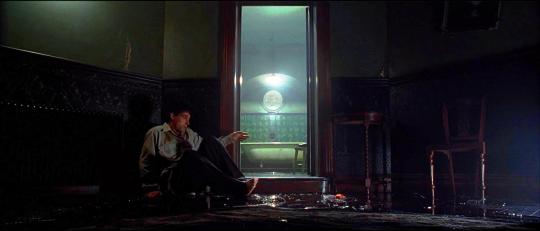


#ProyeccionDeVida
📣 Kino Cat / Cine Tulipán, presenta:
🎬 “DARK CITY” [Ciudad en tinieblas]
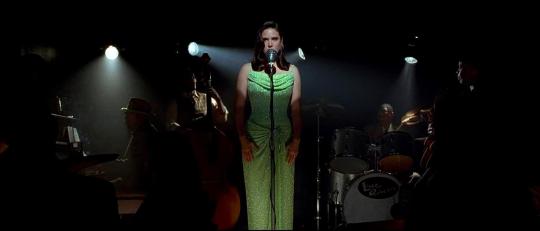
🔎 Género: Ciencia Ficción / Fantástico / Cine Negro / Distopía / Thriller Futurista / Neo-Noir / Película de Culto
⌛️ Duración: 100 minutos
✍️ Guión: Alex Proyas, Lem Dobbs y David S. Goyer

🎼 Música: Trevor Jones
📷 Fotografía: Dariusz Wolski
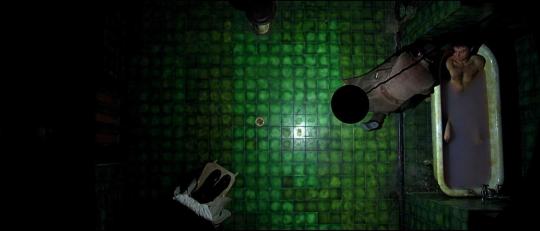
🗯 Argumento: John Murdoch se despierta solo en un extraño hotel y comprueba que ha perdido la memoria y es perseguido como el autor de una serie de sádicos y brutales asesinatos. Mientras intenta juntar las piezas que componen el puzzle de su pasado, descubre un submundo habitado por unos seres conocidos como "los ocultos" que tienen la habilidad de adormecer a las personas y alterar a la ciudad y a sus habitantes.

👥 Reparto: Jennifer Connelly (Emma), Rufus Sewell (John Murdoch), Kiefer Sutherland (Dr. Daniel Schreber), William Hurt (Inspector Frank Bumstead), Melissa George (May), Ian Richardson (Mr. Book), Bill Highfield (Automat Cop), Satya Gumbert (Mr. Sleep) y Colin Friels (Eddie Walenski).
📢 Dirección: Alex Proyas
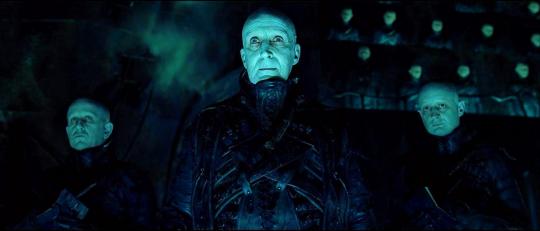
© Productoras: New Line Cinema & Mystery Clock Cinema.
🌎 País: Estados Unidos
📅 Año: 1998

📽 Proyección:
📆 Martes 19 de Noviembre
🕗 9:15pm.

🐈 El Gato Tulipán (Bajada de Baños 350 – Barranco)
🚶♀️🚶♂️ Ingreso libre.
0 notes
Text
Case Studies: Little Hans - Sigmund Freud
Little Hans
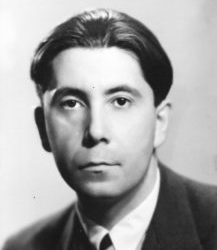
In the early 20th century Sigmund Freud was under pressure to provide evidence to support his theories from client cases. With Dora, Leonardo Da Vinci, and Daniel Paul Schreber, Freud explored similar themes including bisexuality moving between heterosexuality and homosexuality where both environmental challenges, hormonal changes and sexual opportunities availed themselves. And for males, Freud described an intimidation or castration complex where sexuality is affected by traumas of pride. His emphasis on these themes continued with Little Hans, The Ratman, and The Wolfman. With Little Hans, Herbert Graf, Freud was at a disadvantage because he had not yet developed the skills to be a great child Psychoanalyst, so he relied on notes from parents to record their kid's thinking and behaviour patterns. "While I myself supervised the overall plan of treatment and also intervened personally on one occasion by talking to the lad myself, the treatment itself was carried out by the little boy's father." Freud admitted that "...no one else could have persuaded the child to admit so freely to his feelings and nothing could replace the expertise with which the father was able to interpret the utterances of his 5-year-old son: the technical difficulties of carrying out the psychoanalysis of so young a patient would have been insurmountable." Herbert was the son of Max Graf, the music critic, and Olga Hönig who provided most of the material for the analysis. "His parents, who were both among my closest followers, had agreed to bring up their first child with no more constraint than proved necessary to maintain decent behaviour, and as the child developed into a cheerful, good-natured and bright little boy, they proceeded quite happily with their attempt to let him grow and express himself without intimidation."
Infantile Sexuality - Freud: http://psychreviews.org/sexuality-part-2-infantile-sexuality-sigmund-freud/
Sexual theories of children
One of the theories that Freud had to defend was his theories of how children developed sexually before puberty. In Freud's time it was more common to believe that sexuality only begins with puberty. Analysis of a Phobia in a Five-year old Boy, was published a few years after his Three Essays on the Theory of Sexuality. Freud's Oral Phase coincides with breast feeding and an early sexual organization. The review of Little Hans takes place in the period of the Phallic phase, around ages 3 - 4, when children obsess about the penis, sexual differences between men and women and early sexual theories, like that of the stork. Children can be direct with their questions, with parents in most cases misdirecting them with inaccurate answers. Freud recounts notes from Hans's parents:
Hans, aged 3 3/4: 'Daddy, have you got a widdler too?'
Father: 'Of course I have.'
Hans: 'But I've never seen it when you get undressed.'
On another occasion he watches with fascination while his mother undresses at bedtime. She asks 'Whatever are you looking at?'
Hans: 'I'm just looking to see if you've got a widdler too.'
Mummy: 'Of course I have. Didn't you know that?'
Hans: 'No, I thought because you're so big you must have a widdler like a horse's.'"
Freud then moves to the castration complex where early masturbation is punished. "At the same time [Hans's] interest in widdlers is not just theoretical: as we might surmise, it stimulates him to touch that organ as well. At the age of 3 1/2 his mother catches him with his hand on his penis. She threatens him: 'If you do that, I'll tell Dr. A. to come and he'll cut off your widdler. What will you do then when you have to widdle?'
Hans: 'I'll use my botty.'"
"He responds without any sense of guilt as yet, but acquires on this occasion the 'castration complex' that is so often to be inferred from the analysis of neurotics, even though without exception they strenuously resist any acknowledgement of it."
Hans continued noticing penises everywhere including on giraffe's, a cow's udder, and horses.
"I draw a giraffe for Hans... He says to me, 'You must draw his widdler.' I reply, 'Draw it on yourself.' At this he adds a new line to the picture of the giraffe, which at first he leaves short but then adds another line to it, remarking, 'His widdler is longer than that.' Hans and I walk past a horse which is urinating. He says, 'The horse's widdler is down below, like mine.' He watches his 3-month-old sister being bathed and says pityingly, 'Her widdler is really really tiny.' He is given a doll to play with, and undresses her. He looks at her carefully and says, 'Her widdler is only really tiny.'"
Sibling rivalry
"...brothers ought not to pursue honours or powers from the same sources but from different ones. ~ Peter Walcot paraphrasing Plutarch (Moralia 486 B & C)
Hans's father Max describes the reactions of his little Herbert with a new inclusion to the family. "Hans is very jealous of the new arrival and as soon as anyone praises her, finds her pretty, etc., he replies scornfully: 'But she hasn't got any teeth yet.' For when he saw her for the first time he was astonished that she was unable to speak and assumed that the reason she could not speak was because she did not have any teeth. In the early days after the birth he finds himself having to play second fiddle, of course, and suddenly comes down with a very sore throat. In his fever he is heard to say: 'But I don't want a little sister!' It takes about six months for him to get over his jealousy, after which he becomes as affectionate towards Hanna as he is conscious of his own superiority." Here we have the sources of jealousy being insecurity over sources of pleasurable attention and the cure coming from the older sibling being able to find their own superiority to regain security. As long as the child cannot find their own distinctive superiority there will be continued resentment based on the feeling of being replaced by the younger sibling. Conflict is reduced when different talents are developed within different siblings then the conflict can only be escalated again if parents stupidly refuse to acknowledge the value of those different talents and start picking favourites. This lesson extends outwards beyond family to the economy. A peaceful society is one where all the world's cultures are able to trade differences with each other in such a way that as many individuals in society gain a sense of security. Economic crashes and limited varieties of industries can create jealous and envious tensions in the world. These tensions can create war, revolution, and even more subtle problems like chronic unemployment and psychological problems. Freud quotes another older child in his notes in the paper as saying of his younger brother that "the stork can take him back again."
Envy and the Greeks: A study of Human Behaviour by Peter Walcot: https://www.isbns.net/isbn/9780856681462/
Jealous Pets: https://www.youtube.com/watch?v=k_D84wPZ9BU
Bisexuality
"Hans's 5-year-old cousin is here on a visit. Hans, now 4, embraces him continually and during one of these tender embraces and says, 'Oh, I do love you.' This is the first instance of homosexuality that we shall encounter in Hans, but certainly not the last. Our little Hans is apparently the epitome of all the vices! We have moved to a new apartment. (Hans is 4.) A door leads from our kitchen to a narrow balcony, from which one can see into the apartment on the opposite side of the courtyard. Here Hans has discovered a little girl of 7 or 8. Now he sits on the step leading to the balcony waiting to adore her, and will sit there for hours. At 4 O'Clock in particular, when the little girl comes home from school, we cannot keep him in the room, nor stop him from taking up his observation post. On one occasion, when the little girl does not appear at the window at the usual time, Hans becomes very agitated and plagues the servants with questions: 'When is the little girl coming home? Where is she?', etc. When she finally appears he is ecstatic and cannot take his eyes off the apartment opposite. The passion with which Hans embarked on this 'love at a distance' can be explained by the fact that Hans has no little playmate, boy or girl. Frequent contact with other children is obviously a necessary part of a child's normal development."
"Shortly afterwards we leave to spend the summer in Gmunden and Hans (4 1/2) now has company. His playmates are our landlord's the next-door children, Anna (10) and two other little girls whose names I cannot recall, who are about 9 and 7. His favourite is Fritzl, whom he often embraces and assures of his love. On one occasion he is asked, 'Which of the little girls do you like best?' and answers 'Fritzl'. At the same time he is very aggressive towards the girls, swaggers and acts the man, embraces them and smothers them with kisses, which Berta for one very much enjoys. One evening, as Berta is coming out of the room he puts his arms round her neck and says in the sweetest of voices, 'You're so lovely, Berta'; however, this does not stop him from kissing the others and assuring them of his love too. He is also very fond of Mariedl, another of the landlord's daughters who plays with him; she is about 14, and one evening as he is being put to bed he says, 'I want Mariedl to sleep with me.' When he is told, 'She can't do that', he says, 'I want her to sleep with Mummy or Daddy, then.' He is told, 'She can't do that either, Mariedl must sleep downstairs with her parents'."
"On the following occasion, too, Hans said to his Mummy, 'You know, I should so like to sleep with that little girl.' The occasion gives rise to great amusement, for Hans behaves just like a grown-up in love. For some days a pretty little girl, about 8 years old, has been coming into the restaurant where we have lunch, and Hans has of course immediately fallen in love with her. He is constantly turning round on his chair to look at her out of the corner of his eye; he goes over to stand near her and flirt as soon as he has eaten, but goes bright scarlet if anyone catches him at it. If the little girl returns his glance he immediately looks in the opposite direction, covered in shame. His behaviour occasions hilarity, of course, in all the restaurant guests. Every day when we take him into the restaurant he asks, 'Do you think the little girl will be here today?' When she finally comes he goes as red as any adult in the same situation. On one occasion he comes over to me, quite blissful, and whispers in my ear: 'I know where the little girl lives. I've seen her go up the steps in such and such a place.' While he may behave aggressively towards the little girls at home, here he is altogether the platonically languishing beau. This may have something to do with the fact that the girls at home are village children, while this one is a lady of refinement. I have already mentioned that he once said he would like to sleep with her."
Freud's male homosexual theory
Freud continued his theory of male homosexuality by connecting early sexual theories of children where everyone is expected to have a penis. When the penis is then made the prime importance of sexual pleasure, associated with the loving connection of the mother, later discoveries of the vagina and clitoris lead to a disappointment. The desire for a "woman with a penis", as Freud puts it, moves to the new object which is feminine looking male. Of course Freud is in the early days of sexual orientation psychology, but some clues to biology appear in his review of Daniel Paul Schreber's book that show that stress and age related hormonal changes can also affect an adult's sexual orientation even if they were married to a woman and had regular sex with the desire to have a baby. [See: Daniel Paul Schreber: https://rumble.com/v1gu84v-case-studies-daniel-paul-schreber-freud-and-beyond.html] The complexity of sexual orientation is only starting to be unraveled. There are patterns but many people have very individual experiences with their choice of sexual objects and some of confusion has to do with ignorance of biology. At this point in time Freud sticks with his theory of the fluidity of objects and doesn't posit a homosexual drive, or instinct. Instincts for Freud are biological drives to action. "It is quite inappropriate to single out one particular homosexual drive; it is not a peculiarity of his drives that distinguishes the homosexual, but his choice of object." Here Freud pushes a desire for better sexual education of children. Freud says "Hans is homosexual, as all children may very well be, quite in accordance with the undeniable fact that he only knows of one kind of genitalia, genitalia like his own."
Freud then observes Hans's exploration of other girls where he's more bold in some cases, or remains at a distance with yearning. His desire to sleep with them connects with his desire to be in bed with his mother, and Freud even equates the term to "sleep with someone" as an adult term that comes from childhood connections of sleeping in bed with mummy.
Baby wants Blue Velvet - Isabella Rosselini and Dennis Hopper: https://www.youtube.com/watch?v=senNDipdmPo
Little Oedipus
Freud also asserts that when there is a "paucity of other objects of love" children can revert, for example, back to their mother. This hints that Freud's theory views sexuality as something that looks for convenient objects. If parents are the only ones around, then children target their desires towards them. When other children are around, then new targets are made. For example, during summer months in "Gmunden, when his father's alternating presence and absence drew his attention to the conditions that determined that longed-for intimacy with his mother. Later...when Hans could no longer count on his father's going away, the wish was intensified until its content was that his father should go away for good, should be 'dead'." Yet there was some ambivalence toward his father as Freud describes. "Hans feels an intense love for the father against whom he harbours a death-wish, and while his intelligence may lead him to query this contradiction, he is still obliged to demonstrate its reality by hitting his father and then immediately kissing the place where he had hit him." His father recounts...
"Hans, 4 1/4 years old. This morning his mummy gives Hans a bath, as she does every day, then dries him and pats him with talcum powder. As she puts talcum powder around his penis, taking care not to touch it, Hans says, 'Why don't you touch me there?"
Mummy: 'Because that's dirty.'
Hans: 'What? Dirty? Why?'
Mummy: 'Because it's not decent.'
Hans (laughing): 'It's fun, though.'"
"Being helped to do a widdle, which involves unfastening the child's trousers and taking out his penis, is obviously a pleasurable activity for Hans. When they are out on a walk it is of course mainly his father who helps Hans in this way, which provides an opportunity for his homosexual tendencies to become fixed on his father."
"Yesterday, when I took Hans for a wee he asked me for the first time to take him behind the house so that no one could see, and added, 'Last year, when I did a widdle, Berta and Olga watched me.' I take this to mean that last year he enjoyed it when the girls watched him, but doesn't any more. The pleasure of exhibitionism is now being repressed. The repression in real life of his desire to be seen - or helped - by Berta and Olga when he is doing a widdle, explains why it has turned up in his dreams...Since then I have repeatedly observed that he does not wish to be seen when doing a widdle."
"Hans (4 1/2) is again watching his little sister being bathed and starts to laugh. Asked, 'Why are you laughing?' he replies, 'I'm laughing at Hanna's widdler.' 'Why?' - 'Because her widdler's so lovely.' Obviously this is not what he means. Hanna's widdler actually struck him as funny. This is incidentally the first time he acknowledges the difference between male and female genitals, instead of denying it."
Cat showing ambivalence with licking and biting (3:28): https://www.youtube.com/watch?v=S6yngs4woPw
Equinophobia
As the analysis continued Hans's father noticed a phobia begin in his son. "Sexual over-excitement caused by his mother's caresses is no doubt at the root of the problem, but I am at a loss to identify the immediate cause of the disorder. The fear that a horse will bite him on the street seems connected in some way to fear of a large penis - you will recall from my earlier notes that he was aware at a very early stage of the horse's large penis and came to the conclusion that, as she is so big, his mother must have a widdler like a horse's." Freud makes some connections to a dream of Hans's where he loses his mother and is not able to nuzzle with her. This is conflated with the large widdler he assumes his mother has and his hope that "when I get bigger my widdler will grow too." Freud concludes "that he has constantly made comparisons in the course of his observations and remains deeply dissatisfied with the size of his own widdler. He is reminded of this defect by the big animals, which he dislikes for that reason. Since he is probably unable to become fully conscious of this whole train of thought, the painful feeling is transformed into anxiety, so that his present anxiety builds as much on his earlier pleasure as on his present aversion. When once a state of anxiety has been created, anxiety devours all other feelings; as repression takes its course and those once-conscious ideas to which strong feelings have become attached move more and more into the unconscious mind, all the associated emotions may be transformed into anxiety." The repression to not think about the distressing thoughts is motivated by the desire to stop the anxiety. Reminders in the world that connect back to thoughts of a small widdler, including the memory of the threat of castration by the mother, and more recently his first knowledge that girls have different genitalia, and the possibility that he could be widdler-less like them, creates a phobia over any reminder of inferiority. The horse becomes a trigger for anxiety related to inferiority.
Further questioning led to a memory of a horse collapsing while shopping with this mom. Hans imagined that the horse could both bite him or collapse. Freud interpreted the collapsed horse being the father dying so Hans could take his place, but at the same time there was an ambivalence because he also loves his father. Mixed with memories of seeing children hop up on horse driven carts and onto loading ramps, Hans fantasized a danger of the cart moving away just as he hopped onto one and send him crashing down. The horse, or the father, is the incest barrier to the mother. "Behind the original expression of anxiety, the fear that horses will collapse, and both of these, the biting horse and the falling horse, are the father who will punish him because of the wicked desires he harbours against him."
The End - The Doors: https://www.youtube.com/watch?v=LsQtnBu3p7Y
Freud talked to Hans and laid out the characteristics of the horse compared to his father. "...I offered him a partial interpretation of his fear of horses: his father must be the horse, which he had good internal reason to fear. Certain details that aroused fear in Hans, the black around this mouth and in front of his eyes (moustache and spectacles, the prerogatives of the adult male), seemed to me to have been transferred directly from the father to the horses. With this explanation I vanquished the most powerful resistance in Hans to conscious recognition of his unconscious thoughts, since it was his own father who was taking the role of his physician. From this moment on we had conquered the summit of his condition, the material flowed abundantly, the young patient showed courage in communicating the details of his phobia and soon intervened independently in the course of the analysis."
Fecal birth
The parents finally gave in and provided a basic sexual education talk to Hans. "On 24 April my wife and I enlighten Hans up to a point by explaining that babies grow inside the mummy and then are brought into the world like a 'plop' by pushing them out, and that this causes great pain. In the afternoon we go out in the street. He is clearly much relieved, running after carts and carriages, and his residual anxiety is betrayed only by the fact that he does not dare to venture far away from the main entrance, and cannot be persuaded to go for a longer walk at all." Afterwards Hans showed an interest in being a mummy and having children. He imagined his friends being his children, including an imaginary friend Lodi. His play eventually changed his role to become the father and then eventually he bestowed the honor of grandfather and grandmother to his parents. The heavy weight of the cart being pulled by the horse in Hans's memory had further symbolic significance for Freud. "We learn that Hans used to insist on accompanying his mother to the lavatory and that he did the same thing with Berta, who represented his mother at the time, until this was discovered and forbidden. The pleasure derived from watching a beloved person perform such functions corresponds to the 'confluence of drives' / instincts of which we have already seen one example in Hans's behaviour. Hans's father finally turns his mind to the symbolism of plop, and recognizes an analogy between a heavily laden cart and a body weighed down by faecal matter, between the way a cart drives out of the gateway and the way a stool is released from the body." The birth of the baby is treated as a "plop" like when defecating. By use of imagination towards his parents Hans resolved his conflict with his father and mother. Later after puberty Hans will have to take his dream of being a parent and choose an object outside of the family now that he accepts that different people have to be chosen.
Influence through the power of suggestion
The main controversy with Freud's analysis of Hans is the use of his parents as mediators. Shockingly, Freud opens up a can of worms in his paper that goes even beyond it. He makes the excuse that children are less likely to lie than adults, but his main reservation is damaging. "The analysis of a child by his own father, who is steeped in my theoretical views and tainted with my prejudices, is altogether lacking in objective value. A child is of course suggestible to a very high degree, as regards his father, perhaps, more than any other figure; he will allow any words to be put in his mouth out of gratitude to a father who pays him so much attention." The power of suggestion can hardly be better described than that. It presages Freud's later work and object psychology. The reason why most people have voices in their minds is from the rewards and punishments, the giving and withholding of attention from parents, caregivers and powerful people. It's a form of conditioning where suggestions are imitated by children, and adults, to secure attention from others as a reward. This is a weakness that can be exploited by predators, confidence tricksters, cults and advertising. Any attachment wound or emptiness is open for exploitation. With enough repetition children and adults follow the family culture and the wider culture of the world. Even when the original influences are gone, the conditioning remains in the person, motivating actions unconsciously until these attachment needs are brought to consciousness and healthy sources of satisfaction are pursued. If you want to know why you are talking to people in your mind? It's because you want to get agreement and positive attention from them in real life. Real life requires an unreal world to think in, rehearse and strategize in order to make decisions in the actual world. There are also terrible people imitated in our minds and the mind creates stress as if they are really there. They inhibit our choices and we can become like them if we believe their behaviours are rewarding enough to imitate. This is the dark side we all have to fight with and defeat. The real ghosts are impressions in our mind. A fifth column that doesn't always have your best interest at heart.
Luke Skywalker's vision of himself as Darth Vader: https://www.youtube.com/watch?v=jTcLiEI3Wdg
Cult psychology: https://rumble.com/v1gvih9-cult-psychology.html
Thankfully the observer awareness in meditation can heal these influences, desires for attention, and can help to remove the identification with old cultural habits. It can provide, what Freud would later call the "I" or Ego, opportunities to make choices with a sense of play and authenticity in different directions. When people are conscious of their attachment weaknesses, they are more likely to vet choices and compare them to decide which is better, creating a more independent mind. Any basic meditation pursued for a period of time will have interruptions showing the types of objects imitated in the mind. This includes just being mindful while walking and seeing triggers and memories happen in real time. Being able to breathe through them, relax them and release them will be important to create more independence. The importance of this insight is that cults can appear anywhere there is exploitation. Followers need leaders and leaders need followers. Religious or secular sources of these suggestions that leaders provide, including psychoanalysis, all can fall under cult-like appeals to authority, where a leader is always to be believed and a follower obeys. Watching our attachment wounds and deficits can protect us from predators, especially the friendly looking ones, who are watching from a distance.
Slow boat to China: The Master - Philip Seymour Hoffman and Joaquin Phoenix: https://youtu.be/SeNU4axJOjw
How to motivate yourself - Freud and Beyond: https://rumble.com/v1gv3zl-how-to-motivate-yourself-freud-and-beyond.html
The Wolfman and other cases - Sigmund Freud: https://www.isbns.net/isbn/9780142437452/
Psychology: http://psychreviews.org/category/psychology01/
#littlehans#sigmund freud#casestudies#psychoanalysis#phobia#equinophobia#psychology#Castrationcomplex#oedipus complex#envy#sibling rivalry
0 notes
Text
Watched both films last night…oh my god, so many emotions ���� Both films are emotional roller coasters 🎢😩 I also watched his other very early film called The Bay Boy.

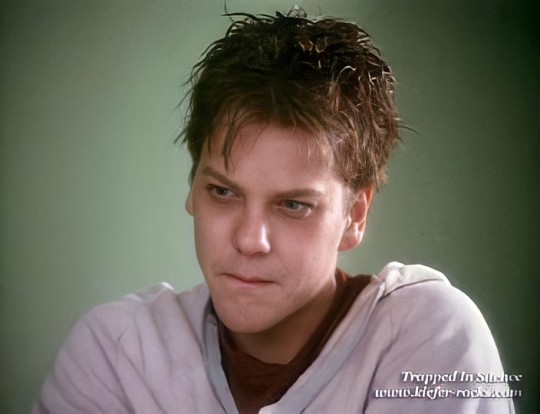
Two little guys with a lot of problems, both lovely♥️
#kiefer sutherland#crazy moon#brooks#kevin#trapped in silence#the bay boy#the lost boys#tlb david#Donald Campbell#woman wanted#dark city#dr daniel schreber#wendell goddard
43 notes
·
View notes
Text
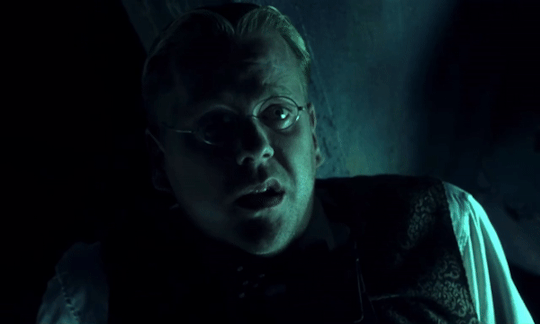





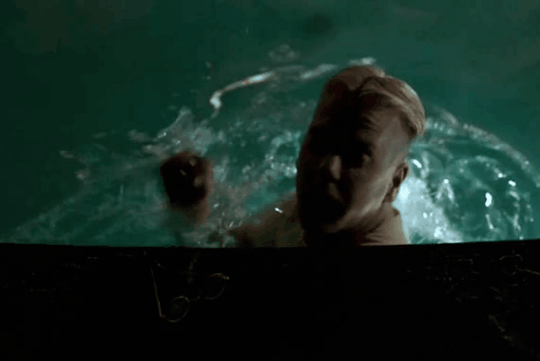



----
Guys!!!! I freaking love Dark City, and Daniel is one of my all time favorites of Kiefers characters, next to David that is. (Depends on my mood, weather I crave being dominant, or being dominated 😉.)
Link to the article here.
I really hope we get some more of my favorite skittish Doctor. 🥰 He's so freaking cute!
#Dark city#Dark City Daniel#kiefer sutherland#article#link#Gif#Dr. Daniel Schreber#Dark City 1998#Dr. Schreber#Dr Daniel Schreber#Daniel Schreber#he's so god damn cute#like I wanna pamper the hell outta this man#absolutely cover his face in hundreds of kisses until he's an absolute blushing mess
54 notes
·
View notes
Text


Imagine # 775
2,183 - Words
Gif NOT mine. (Found on Pinterest.)
If this gif is yours (or you know who's it is) please let me know, so I can give you/them credit.
Gif credit goes to - Unknown.
Year posted - 2021
----
Curled up in bed comfortably, (Y/n) tried desperately to fall asleep. Yet as the minutes ticked by she found herself restless, and inevitably annoyed. With a distraught sigh (Y/n) sat up in bed, flinging her blankets away from her body. The moment the cool air of her room hit her bare legs (Y/n) shivered, but as she rubbed her face tiredly, a loud ringing sound rang through the room. The sound and pitch being loud enough to make (Y/n) cry out, her hands covering her ears and her eyes screwed shut. Hissing in pain she fell from her bed, but instead of hitting the floor she continued to fall. In an instant her eyes sprung open and (Y/n) screamed, she was falling from the sky at rapid speed. She hit the pavement with a painful grunt, the air being knocked from her lungs, and her head spinning. Dr. Schreber had nearly jumped out of his skin when this strange looking woman landing a few feet away from him on the sidewalk. "Ah." (Y/n) hissed under her breath as she tried to move, freezing when she someone called out to her. "Don't move!" Schreber cried out with worry, as he hobbled to her side as quickly as he could. (Y/n) frowned as she looked up to the man, as he slowly knelt beside her, his hands upon her face as he looked into her eyes. "I'm a Doctor." He murmured softly, as he continued to observe her, looking for any wounds. "Where am I Doc?" (Y/n) licked her lips, holding back a hiss of pain as he helped her sit up. "You don't know?" He frowned a little confused. "Look Doc about twenty seconds ago I was laying in my bed in (Y/h/t), next thing I know there was this deafening ringing, then I was falling from the sky." (Y/n) pointed to the dark sky, to which Schreber looked up, half expecting to see some portal or something. "How I didn't die on impact is freaking me out." (Y/n) added before she observed her surroundings, frowning as she took note of the cars lining the streets. "Check that... This place is freaking me out." She looked to the Doctor, who looked rather alarmed and nervous. "I-I can help you." He stammered. "How?" (Y/n) wondered aloud as she stood to her feet, the cold night air nipping at her exposed skin, as she stood there in her night time attire. "I can't e-explain here, please come with me." The Doctor looked around frantically, walking off in the opposite direction a moment later.
Following the Doctor (Y/n) ignored the strange looks she was receiving from the people they passed. "I-its safer in here." He waved for her to follow, leading her into the indoor pool. "Safe from what, Jason Voorhees?" (Y/n) murmured to herself, her eyes almost hypnotically casting to the ceiling, smiling faintly at the sight of its artistic beauty. "You can change in here." The Doctor showed (Y/n) into a more private room. "Excuse me?" (Y/n) arched a brow at him, crossing her arms over her chest. "It's safer in the water, please trust me. I want to help you." He encouraged her, and while part of her told her these were some serious red flags, she indulged his wish. Stepping into the room she found a locker with a clean swimsuit, however when she looked at it she sneered. "So not happening." She sighed under her breath, looking around she attempted to find something more to her liking. However after a few minutes with no success she simply exited the room, finding the Doctor waiting in the water. "You didn't change." He pointed out with a distraught frown. "Please you need-" (Y/n) was quick to silence him by holding her hand up. "You're the strangest Doctor I've ever met, however I feel inclined to trust you. But before I do as you ask, I want to know your name." (Y/n) rest her wight on one hip, propping her opposite hand onto the opposite hip. "M-my name i-is Doctor Daniel Schreber." He stammered with a small blush, his eyes involuntarily trailing up her bare legs. "My names (Y/f/n) (Y/l/n)." She introduced herself before she stripped herself of her tee shirt and shorts, leaving her in a matching set of bra and panties. "Oh!" Daniel squeaked in surprise, quickly averting his eyes elsewhere.
(Y/n) sat at the edge of the pool before she slipped in slowly, the temperature difference sending a shiver up her spine. "So Doctor Schreber, why are we here?" (Y/n) asked as she slowly swam closer to his side, tilting her head with a faint smile at Daniels nervousness to look at her. "B-because t-this." He cut himself off, taking a deep breath before he continued. "This is the safest place to talk." He explained, trying to focus his eyes on (Y/n)'s, finding the sight of the supple looking flesh of her breasts almost unbearable. "Safest from who?" (Y/n) asked as she moved to sit beside Daniel. "The Strangers." He pushed his glasses up a little, quickly glancing around them to make sure they were alone. "Please... I need you to tell me everything that happened, before they find us." Daniel was almost whispering. "I already did. I was at home trying to fall asleep, but I couldn't. In my frustration I pushed off my blankets and was rubbing my face when this loud ringing started. I covered my ears and fell from my bed, but I never hit my bedroom floor. Instead I just kept falling, when I opened my eyes I was falling from the sky. I hit the ground, and then you came to me." (Y/n) explained, only confusing Daniel further. "Where did you come from?" He murmured with a tilt of his head. "(Y/h/t)?" (Y/n) frowned with confusion. "I've never heard of it." Daniel mirrored her frown. "Am I dead Doctor Schreber?" (Y/n) whispered softly. "No I don't think so." Daniel shook his head dismissively. "Then why is this place familiar to me?" (Y/n) whispered even quieter. "I don't know... I've never seen you before... I've never seen anyone like you before." Daniel admitted, quickly sparring a glance at one of her tattoos. "Good observation Doctor." A voice called out as a tall man dressed in all black entered the room, Daniel gasped in surprise, fear pooling within his eyes. While (Y/n) simply looked at the new man with questioning eyes. "Who are you?" (Y/n) asked, ignoring the fact that Daniel was swimming back to stay away from the approaching man. "Mr. Book." He stood up a little straighter. "Right." (Y/n) rose her brows with mocked sarcasm. "And who are you?" Mr. Book asked in a bored tone. "(Y/n)." She only offered her first name, not trusting this man like she had the Doctor. "Well then (Y/n) I suggest you get out of the water." Mr. Book waved his hand towards the pool ladder. "And if I don't want to?" (Y/n) argued. "(Y/n) please do as he says." Daniel whispered pleadingly. "You should listen to the Doctor." Mr. Book mused, (Y/n) looked to Daniel, finding his fearful gaze locked onto her. "Fine." She exited the pool, Daniel following behind her when Mr. Book demanded his presence as well.
"Sleep." Mr. Book waved his hand in front of (Y/n)'s face, who frowned at him. "What are you doing?" She scowled taking a small step back, both Mr. Book and Daniel looking at her with astonishment. "Sleep." Mr. Book tried again, this time however (Y/n) shoved his hand away. "Fuck off." She hissed, thoroughly annoyed with the pale humanoid being. "Fascinating." Daniel muttered with an amazed grin. Mr. Book however was not quite so amused, trying to throw her back like a ragdoll with his powers. "Why are you looking at me like that?" (Y/n) frowned at the stranger. "What are you?" The stranger frowned when his powers failed to work on her. "I could ask you the same question." (Y/n) retorted, unknowingly making Daniel internally snicker. "You're coming with us." Mr. Book concluded, two more of his companions entering the building. "No." (Y/n) crossed her arms, ignoring the cold chill that ran down her body, caused by both the beings presence, and the fact that she was still dripping wet from the pool. "That wasn't a request." He retorted as he pulled out a knife, Daniel wanted to intervene, but he was afraid it would only make matters worse. However (Y/n) simply rolled her eyes as she uncrossed her arms, pushing passed Mr. Book she grabbed her clothes and pulled them back on. "Fine." She sighed as she re approached him, crossing her arms again. Daniel found her bravery both admirable, and worrying. Mr. Book allowed Daniel to get dressed before he and his companions escorted them out of the building, leading them down below into the strangers lair. As (Y/n) observed her surroundings, she linked her arm with Daniels, momentarily starting the man. She smiled softy at that, leaning in to his side she whispered into his ear. "I remember why this is so familiar now." His eyes widened as he turned his head to look at her, a blush fanning his cheeks when she winked, keeping her arm linked with his.
"I'm of no danger to you all you know." (Y/n) stated casually, Mr. Book stopped walking, turning to look at her. "I've been trying to will that knife of yours through you, and it ain't working." She whispered dramatically, her free hand beside her mouth. "I can't do what you do, your mojo just don't work on lil old me." (Y/n) added with a small giggle. "How can you know what we were thinking?" Mr. Book glowered down at her. "I don't know what you're thinking, I just happen know what conclusion you all jumped to, because well I hate to be the one to tell you. But you're not real, at least not in my world. In my world you're all just characters in a movie that come out in the late 90s. However by the looks of things, this is set before that timeline." (Y/n) shrugged casually, her words momentarily stunning everyone within ear shot. "He's played by Kiefer Sutherland, one of my all time favorite actors." She added pointed her free hand to Daniel. "I just didn't realize it earlier, guess I was still in a daze from that blow to the head." (Y/n) admitted to Daniel specifically, his shocked face undeniably adorable. "If you don't believe me, you should know that I was born (Y/b/d) and I was living somewhat peacefully in the year 2021, even with a global pandemic going on since the very end of 2019." (Y/n) pointed to herself with her free hand. "Hence why I look so strange compared to everyone else here in Dark City." She smiled faintly, giggling to herself when the strangers began chattering among themselves in their native language. "Is all of that true?" Daniel whispered. "Yeah." (Y/n) nodded her head, with a grin cast his way.
After a few hours of the strangers asking (Y/n) questions about this and that, along with some tests they demanded to run. She was allowed to leave with Doctor Schreber, with her memories intact. (Simply because they couldn't alter her memories along with everything else.) With an almost exhausted sigh, both she and Daniel sat down on the couch in his apartment. "Is it true that, that Sutherland fellow is one of your favorite actors?" Daniel hesitated to ask after a moment. "Oh yeah, he's a good actor. It also helps that I find him incredibly handsome. Plus I have a weakness for blondes." (Y/n) admitted shamelessly, her words causing a blush to bloom on Daniels cheeks. "O-oh." He stuttered bashfully. "Did... Did you like the movie, this one?" He asked after he gathered his composure. "One of my favorites." (Y/n) smiled as she turned her body to look at Daniel. "You're my favorite character." She added in a whisper. "R-really?" He turned his head to look at her, his eyes as wide as saucers. "Yep... You're just so cute." (Y/n) cooed with a wolfish grin, her words making Daniel all flustered. "T-thank you." He stammered with a nervous chuckle. "You are very welcome Doctor." (Y/n) hummed casually, her tone making Daniel swallow thickly. "I think it is going to be quiet interesting to get to know you (Y/n)." Daniel mused aloud. "Likewise Doctor." (Y/n) hummed. "Please call me Daniel." He murmured quietly. "Alright then... Daniel." She cooed his name, making it sound oh so heavenly to the flustered man.
----
Not my best work, but eh I still like it.
#imagine#gif imagine#daniel schreber#Dr daniel schreber#daniel schreber imagine#daniel schreber x reader#Dr daniel schreber imagine#Dr daniel schreber x reader#dark city#dark city 1998#dark city imagine#dark city x reader#dark city daniel schreber#kiefer sutherland x reader#kiefer sutherland imagine#kiefer sutherland#extended#The strangers#dark city the strangers
88 notes
·
View notes
Text
Lastest Kiefer movie I have seen is ‘Dark
City’. I found it weird but still enjoyed it 👍🏻
Btw, Dr Daniel Schreber is creepy but cute in a strange sort of way 🥰😂


#dark city#dr Daniel schreber#kiefer sutherland#the lost boys (1987)#david tlb#Wendell Goddard#woman wanted#stand by me#ace merrill
64 notes
·
View notes
Text
Awesome art 🤩 @midnight-in-santa-carla

So unfortunately I was really ill last week, but it did give me time to finally watch Dark City (which I loved and wow doesn’t The Matrix steal an awful lot from it!) So of course I had to do some Dr Schreber studies. I thought he was a great character, but god did his hair give me awful flashbacks to the middle partings guys had in the 90’s 😂
46 notes
·
View notes
Text
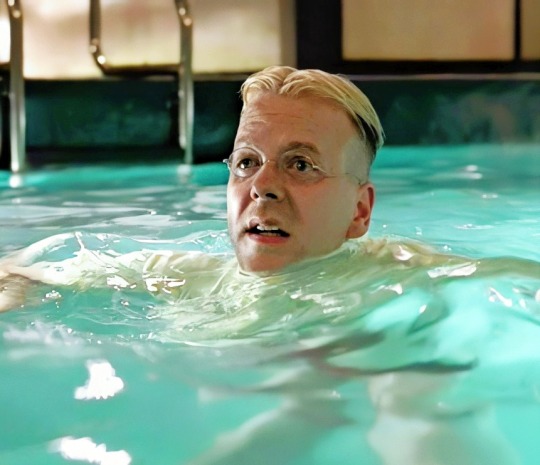
Dark City (1998) - Dr. Daniel P. Schreber
Edit by me; Original print: kiefer-rocks.com
#dark city#dr daniel p schreber#dr daniel schreber#kiefer sutherland#and my sweet sweet boy because I need it to see him today
26 notes
·
View notes
Text
Case Studies: Daniel Paul Schreber
Open letter to Flechsig
In his book, Memoirs of my nervous illness, delivered to his Psychiatrist Professor Flechsig, Daniel Paul Schreber enclosed a perplexing letter... "I do not harbor any personal grievance against any person. My aim is solely to further knowledge of truth in a vital field, that of religion...Your name plays an essential role...in that certain nerves taken from your nervous system became 'tested souls'...and...exerted a damaging influence on me and still does to this day...I think it is possible that you...carried on some hypnotic, suggestive...contact with my nerves, even while we were separated in space...This 'tested soul' allowed itself to be driven by the impulse of ruthless self-determination and lust for power...I need hardly mention of what immeasurable importance it would be if you could in any way confirm the surmises I have sketched above...The rest of my thesis would thereby gain universal credence and would immediately be regarded as a serious scientific problem to be investigated in every possible way." ~ March 1903
Daniel Paul Schreber
Born in Germany in 1842, Daniel Paul Schreber grew up to be a lawyer and then a judge. He was married, and by the age of 42 he had his first psychological breakdown. He recovered after treatment from Dr. Flechsig, and after some years he relapsed and ended up in and out of asylums until his death. "I have twice had a nervous illness, each time in consequence of mental over-strain; first was occasioned by my candidature for parliament, the second by the extraordinary burden of work on taking up office as President of the Senate of a Court of Appeal in Dresden, to which I had been newly appointed." After the first collapse "I was eventually cured, and therefore I had at the time no reason to be other than most grateful to Professor Flechsig...After recovering from my first illness I spent eight years with my wife, on the whole quite happy ones, rich also in outward honors and marred only from time to time by the repeated disappointment of our hope of being blessed with children."
During one night in bed, Paul had a negative premonition that something was wrong. "I had dreamed several times that my former nervous illness had returned; naturally I was as unhappy about this in the dream, as I felt happy on waking that it had only been a dream. Furthermore, one morning while still in bed, I had a feeling which struck me as highly peculiar. It was the idea that it really must be rather pleasant to be a woman succumbing to intercourse. This idea was so foreign to my whole nature that I may say I would have rejected it with indignation if fully awake; from what I have experienced since I cannot exclude the possibility that some external influences were at work to implant this idea in me."
As Paul began losing sleep, even while taking sleep medication, he was beginning to hallucinate. "During several nights when I could not get to sleep, a recurrent crackling noise in the wall of our bedroom became noticeable at shorter or longer intervals, time and again it woke me as I was about to go to sleep. Naturally we thought of a mouse although it was very extraordinary that a mouse should have found its way to the first floor of such a solidly built house. But having heard similar noises innumerable times since then, and still hearing them around me every day in day-time and at night, I have come to recognize them as undoubted divine miracles - they are called 'interferences' by the voices talking to me - and I must at least suspect, without being too definite about it, that even then it was already a matter of such a miracle; in other words that right from the beginning the more or less definite intention existed to prevent my sleep and later my recovery from the illness resulting from insomnia."
Returning to Dr. Flechsig for more treatment, "he spoke of the advances made in psychiatry since my first illness, of newly discovered sleeping drugs, etc., and gave me hope of delivering me of the whole illness through one prolific sleep," but unfortunately the treatment didn't work. "Professor Flechsig..,advised my admission into his Asylum, for which I set out immediately by cab accompanied by him...After about the fourth or fifth night after my admission to the Asylum, I was pulled out of bed by two attendants in the middle of the night and taken to a cell fitted out for dements (maniacs) to sleep in...The way led through the billiard room; there, because I had no idea what one intended to do with me and therefore thought I had to resist, a fight started between myself clad only in a shirt, and the two attendants, during which I tried to hold fast to the billiard table, but was eventually overpowered and removed to the above-mentioned cell. There I was left to my fate; I spent the rest of the night mostly sleepless in this cell, furnished only with an iron bedstead and some bedding. Regarding myself as totally lost, I made a naturally unsuccessful attempt during the night to hang myself from the bedstead with the sheet. I was completely ruled by the idea that there was nothing left for a human being for whom sleep could no longer be procured by all the means of medical art, but to take his life. I knew that this was not permitted in Asylums, but I labored under the delusion that when all attempts at cure had been exhausted, one would be discharged - solely for the purpose of making an end to one's life either in one's own home or somewhere else."
With the help of chloral hydrate, Paul was able to gain some sleep. His wife continued to visit him until his state worsened. "A further decline in my nervous state and an important chapter in my life commenced about the 15th of February 1894 when my wife, who until then had spent a few hours every day with me and had also taken lunch with me in the Asylum, undertook a four-day journey to her father in Berlin in order to have a holiday herself, of which she was in urgent need. My condition deteriorated so much in these four days that after her return I saw her only once more, and then declared that I could not wish my wife to see me again in the low state into which I had fallen. From then on my wife's visits ceased; when after a long time I did see her again at the window of a room opposite mine, such important changes had meanwhile occurred in my environment and in myself that I no longer considered her a living being, but only thought I saw in her a human form produced by miracle in the manner of the 'fleeting-improvised-men.' Decisive for my mental collapse was one particular night; during that night I had a quite unusual number of pollutions [orgasms] (perhaps half a dozen)...From then on appeared the first signs of communication with supernatural powers, particularly that of nerve-contact which Professor Fleschig kept up with me in such a way that he spoke to my nerves without being present. From then on I also gained the impression that Professor Flechsig had secret designs against me; this seemed confirmed when I once asked him during a personal visit whether he really honestly believed that I could be cured, and he held out certain hopes, but could no longer- at least so it seemed to me - look me straight in the eye."
The World Order
As Paul's illness progressed his delusional world took over. In his book Memoirs of my nervous illness, Paul elaborated on a complex world and religion. In his world the human soul "is contained in the nerves of the body, and the total mental life of a human being rests on their excitability by external impressions...Vibrations are thereby caused in the nerves which produce the sensations of pleasure and pain...and they are able to retain the memory of impressions received."
"Impressions received remain attached to the nerves. The soul, as it were, only goes into hibernation as some lower animals do and can be re-awakened to a new life..." God in Paul's religion "is only nerve, not body, and akin therefore to the human soul. But unlike the human body, where nerves are present only in limited numbers, the nerves of God are infinite and eternal. They possess the same qualities as human nerves but in a degree surpassing all human understanding. They have a faculty of transforming themselves into all things of the created world; in this capacity they are called rays; and herein lies the essence of divine creation...God is able to perceive everything that happens on earth and possibly on other inhabited planets...All He sees He enjoys as the fruits of His creative power, much as a human being is pleased with what he has created with his hands or with his mind...God left the world to their own devices and only provided continuous warmth of the sun...God did not interfere directly in the fate of peoples or individuals...It could however occur now and then as an exception...a fervent prayer might in a special case induce God to give help by intervening with a miracle...I have on innumerable occasions experienced in my own body and continue to do so daily even now that God has, for instance, the power to remove from the human body any germ of illness by sending forth a few pure rays."
Paul then describes the afterlife. His God approaches corpses "in order to draw their nerves, in which self-awareness was not extinct but quiescent, out of their bodies up to Himself by the power of the rays, thereby awakening them to new heavenly life; The new life beyond is the state of Blessedness to which the human soul could be raised. But this did not occur without prior purification and sifting of the human nerves which required, according to the variable condition of the respective human souls, a shorter or longer time of preparation, and perhaps even certain intermediate stages. Only pure human nerves were of use to God - or if one prefers, in heaven - because it was their destiny to be attached to God Himself and ultimately to become in a sense part of Him as 'forecourts of heaven.' The nerves of morally depraved men are blackened; morally pure men have white nerves; the higher the man's moral standard in life, the more his nerves become completely white or pure, an intrinsic property of God's nerves...The process of purification was connected with a feeling of an unpleasant task for the souls, or perhaps of an uncomfortable sojourn in the underworld, which was necessary to purify them gradually."
"Fleeting-improvised-men"
Like all religions, there's an element of reward and punishment to gain the favor of the divine. "The souls undergoing the process of purification were variously graded as 'Satans,' 'Devils,' 'Assistant Devils,' 'Senior Devils,' and 'Basic Devils, when set down as 'fleeting-improvised-men,'" which are souls temporarily given human shape by divine miracle. These souls (including Jesus Christ) can be from prior lives and resurrected to test souls after an apocalypse, an apocalypse which Paul thought he actually survived. "The transmigration of souls also seems to have served the purpose of purifying human souls and was widespread, as a number of experiences lead me to believe. In this process the human souls concerned were called to a new human life on other planets, presumably by being born in the manner of a human being, perhaps retaining some dim memory of their earlier existence...From the voices that speak to me...I learnt of a number of persons to whom in after life a much lower station was allotted than they had held in the previous one, perhaps as a kind of punishment...Souls completely cleansed by the process of purification ascended to heaven and so gained the state of Blessedness. This consisted of uninterrupted enjoyment combined with the contemplation of God...Souls' greatest happiness lies in continuing reveling in pleasure combined with recollections of their human past." And of course, since this was during the turn of the 20th the century, "the male state of Blessedness was superior to the female state; the latter seems to have consisted mainly in an uninterrupted feeling of voluptuousness...The ultimate destiny of all souls is to merge with other souls, and integrate into higher entities, remaining aware only of being part of God."
The dark side of Paul's religion was how a Devil could commit Soul Murder to prevent uninterrupted Blessedness. "...It is somehow possible to take possession of another person's soul in order to prolong one's life at another soul's expense, or to secure some other advantages which outlast death...The main role is supposed to be played by the Devil, who entices a human being into selling his soul to him...for some worldly advantages...[Assuming] that torturing a soul as an end in itself gave the Devil special pleasure."
Paul's world included communication from God via the nerves, but also influences from those he did not want access to his nerves. "Divine rays above all have the power of influencing the nerves of a human being in this manner; by this means God has always been able to infuse dreams into a sleeping human being. I myself first felt this influence as emanating from Professor Flechsig. The only possible explanation I can think of is that Professor Flechsig in some way knew how to put divine rays to his own use...This influence has in the course of years assumed forms more and more contrary to the Order of the World and to man's natural right to be master of his own nerves, and I might say become increasingly grotesque."
Compulsive thinking
Paul then describes the experience of his illness and how trapped he felt by his intrusive thoughts. "The nature of compulsive thinking lies in a human being having to think incessantly; in other words, man's natural right to give the nerves of his mind their necessary rest from time to time by thinking nothing was from the beginning denied me by the rays in contact with me; they continually wanted to know what I was thinking about. For instance I was asked in these very words: 'What are you thinking of now?'; because my nerves did not react to this absurd question, one was soon driven to take refuge in a system of falsifying my thoughts. For instance the above question was answered spontaneously: 'He should think about the order of the world'; that is to say the influence of the rays forced my nerves to perform the movements corresponding to the use of these words. The number of points from which contact with my nerves originated increased with time: apart from Professor Flechsig, who was the only one whom for a time at least I knew definitely to be among the living, they were mostly departed souls who began more and more to interest themselves in me."
"All these souls spoke to me as 'voices' more or less at the same time without one knowing of the presence of the others. Everyone who realizes that all this is not just the morbid offspring of my fantasy, will be able to appreciate the unholy turmoil they caused in my head."
Despite all this struggle, Paul was able to find periods of mental silence in life. "Playing the piano and reading books and newspapers is - as far as the state of my head allows - my main defense, which makes even the most drawn-out voices finally perish; at night when this is not easily done or in day-time when the mind requires a change of occupation, I usually found committing poems by heart...which I then recite in silence on the quiet verbatim...However insignificant the rhymes, even obscene verses are worth their weight in gold as mental nourishment compared with the terrible nonsense my nerves are otherwise forced to listen to."
Unmanning
Paul Schreber's narrative of the Order of the World moves into Biblical destruction and renewal. "The second point to be discussed in this chapter is the tendency, innate in the Order of the world, to unman a human being who has entered into permanent contact with rays. This is connected on the one hand with the nature of God's nerves, through which Blessedness is felt, if not exclusively as, at least accompanied by, a greatly increased feeling of voluptuousness; on the other hand it is connected with the basic plan on which the Order of the World seems to rest, that in the case of world catastrophes which necessitate the destruction of mankind on any star, whether intentionally or otherwise, the human race can be renewed. When on some star moral decay ("voluptuous excesses") or perhaps nervousness has seized the whole of mankind to such an extent that the forecourts of heaven could not be expected to be adequately replenished by their excessively blackened nerves, or there was reason to fear a dangerous increase of attraction on God's nerves, then the destruction of the human race on that star could occur either spontaneously (through annihilating epidemics, etc.) or, being decided on by God, be put into effect by means of earthquakes, deluges, etc."
Bringing in influences from Otto Weininger, which you can see my review of Dora and Freud, and influences from The Last Men by Wolfgang Kirschbach, Paul again compares Jewish people with femininity. "The Eternal Jew (in the sense described) had to be unmanned (transformed into a woman) to be able to bear children. This process of unmanning consisted in the (external) male genitals (scrotum and penis) being retracted into the body and the internal sexual organs being at the same time transformed into the corresponding female sexual organs, a process which might have been completed in a sleep lasting hundreds of years, because the skeleton (pelvis, etc.) had also to be changed. The rays of the lower God (Ariman) have the power of producing the miracle of unmanning; the rays of the upper God (Ormuzd) have the power of restoring manliness when necessary." Paul then indirectly asserts that the same phenomenon is happening to him. "I have myself twice experienced (for a short time) the miracle of unmanning on my own body; that the miracle did not reach full development and that it was even reversed again, was due only to the fact that, apart from the pure rays of God, other rays were present led by 'tested' (impure) souls, Flechsig's rays and others, which prevented the completion of the process of transformation in its purity and in accordance with the Order of the World. The Eternal Jew was maintained and provided with the necessary means of life by the 'fleeting-improvised-men'; that is to say souls were for this purpose transitorily put into human shape by miracles, probably not only for the lifetime of the Eternal Jew himself but for many generations, until his offspring were sufficiently numerous to be able to maintain themselves. This seems to be the main purpose of the institution of 'fleeting-improvised-men' in the Order of the World."
Blaming Flechsig
Paul's narrative eventually falls on a scapegoat for the experience of his unmanning. "It is in my opinion that Professor Flechsig must have had some idea of this tendency, innate in the Order of the World, whereby in certain conditions the unmanning of a human being is provided for; perhaps he thought of this himself or these ideas were inspired in him by divine rays, which I think is more likely...The dependence on Professor Flechsig, or on his soul, in which God found Himself through His inability to dissolve again the nerve-contact which Professor Flechsig had managed to establish and then to abuse by holding fast to it. Thus began the policy of vacillation in which attempts to cure my nervous illness alternated with efforts to annihilate me as a human being who, because of his every-increasing nervousness, had become a danger to God Himself...Professor Flechsig had found a way of raising himself up to heaven, either with the whole or part of his soul, and so making himself a leader of rays, without prior death and without undergoing the process of purification. In this way a plot was laid against me, the purpose of which was to hand me over to another human being after my nervous illness had been recognized as, or assumed to be, incurable, in such a way that my soul was handed to him, but my body - transformed into a female body and, misconstruing the above-described fundamental tendency of the Order of the World - was then left to that human being for sexual misuse and simply 'forsaken,'in other words left to rot...The way I was treated externally seemed to agree with the intention announced in the nerve-language; for weeks I was kept in bed and my clothes were removed to make me - as I believed - more amenable to voluptuous sensations, which could be stimulated in me by the female nerves which had already started to enter my body; medicines, which I am convinced served the same purpose, were also used, these I therefore refused, or spat out again when an attendant poured them forcibly into my mouth...God Himself must have known of the plan, if indeed He was not the instigator, to commit soul murder on me, and to hand over my body in the manner of a female harlot."
Yet despite all these challenges Paul found emotional support in his important place in the World Order. "All attempts at committing soul murder, at unmanning me for purposes contrary to the Order of the World (that is to say for the sexual satisfaction of a human being) and later at destruction of my reason, have failed. From this apparently so unequal battle between one weak human being and God Himself, I emerge, albeit not without bitter sufferings and deprivations, victorious, because the Order of the World is on my side."
Redemption through repopulation
What was not contrary to the World Order according to Paul was eventually reassessed as having a important goal for the future of humanity. "For my part I was always led by the desire to draw these souls and soul parts to myself and so ultimately to cause their dissolution; I started from the perfectly sound supposition that when all 'tested' or impure souls had been eliminated from their position of so-called middle instances between myself and God's omnipotence, a solution of the conflict in consonance with the Order of the World would follow automatically; either a cure by a complete calming of my nerves through sleep, or - a possibility I later considered - unmanning, in consonance with the Order of the World, with the purpose of creating new human beings...several times (particularly in bed) there were marked indications of an actual retraction of the male organ."
Paul then describes his struggle with his feminine impulses. "For over a year therefore the female nerves, or nerves of voluptuousness, which had penetrated my body in great masses, could not gain any influence on my behaviour or on my way of thinking. I suppressed every feminine impulse by exerting my sense of manly honor and also by the holiness of my religious ideas, which occupied me almost exclusively; indeed I really became aware of the presence of female nerves only when they were artificially set in vibration by rays on certain occasions so as to produce a sensation of timidity and to 'represent' me as a human being trembling with feminine anxiety. On the other hand my will power could not prevent the occurrence, particularly when lying in bed, of a sensation of voluptuousness which as so called 'soul-voluptuousness' exerted an increased power of attraction on the rays...During that time the signs of a transformation into a woman became so marked on my body, that I could no longer ignore the imminent goal at which the whole development was aiming. In the immediately preceding nights my male sexual organ might actually have been retracted had I not resolutely set my will against it, still following the stirring of my sense of manly honor; so near completion was the miracle. Soul-voluptuousness had become so strong that I myself received the impression of a female body, first on my arms and hands, later on my legs, bosom, buttocks and other parts of my body."
Blessedness and voluptuousness
In the end of the 1800's naturally these tendencies would have to be hidden. "Few people have been brought up according to such strict moral principles as I, and have throughout life practiced such moderation especially in matters of sex, as I venture to claim for myself...I [would not] ever betray any sexual lust in contact with other people. But as soon as I am alone with God, if I may so express myself, I must continually or at least at certain times, strive to give divine rays the impression of a woman in the height of sexual delight; to achieve this I have to employ all possible means, and have to strain all my intellectual powers and foremost my imagination."
To justify these feelings Paul had to explain the limits of his voluptuous enjoyment. "I have frequently referred in this book to the close relationship which exists between voluptuousness and everlasting Blessedness. Voluptuousness can be considered as part of everlasting Blessedness and is in a sense inherent in man and other living beings. Voluptuous enjoyment of Blessedness is granted to souls in perpetuity as an end in itself, but to a human being and other living creatures solely as a means for the preservation of the species. Herein lie the moral limitations of voluptuousness for human beings. An excess of voluptuousness would render man unfit to fulfill his other obligations; it would prevent him from ever rising to higher mental and moral perfection; indeed experience teaches that not only single individuals but also whole nations have perished through voluptuous excesses. For me such moral limits to voluptuousness no longer exist, indeed in a certain sense the reverse applies. In order not to be misunderstood, I must point out that when I speak of my duty to cultivate voluptuousness, I never mean any sexual desires towards other human beings (females) least of all sexual intercourse, but that I have to imagine myself as man and woman in one person having intercourse with myself, or somehow have to achieve with myself a certain sexual excitement, etc. - which perhaps under other circumstances might be considered immoral - but which has nothing whatever to do with any idea of masturbation or anything like it.
The justification goes further into divine realms, as a permission to enjoy his sensations. "This behavior has been forced on me through God having placed Himself into a relationship with me which is contrary to the Order of the World. God wishes it. God is inseparably tied to my person through my nerves' power of attraction which for some time past has become inescapable; there is no possibility of God freeing Himself from nerves for the rest of my life - although His policy is aimed at this - except perhaps in case my unmanning were to become a fact. On the other hand God demands constant enjoyment, as the normal mode of existence for souls within the Order of the World. It is my duty to provide Him with it in the form of highly developed soul-voluptuousness, as far as this is possible in the circumstances contrary to the Order of the World. If I can get a little sensuous pleasure in this process, I feel I am entitled to it as a small compensation for the excess of suffering and privation that has been mine for many years past; it also affords some small recompense for the manifold painful trials and tribulations which I have to suffer even now, particularly when soul-voluptuousness diminishes. I know that I do not offend against any moral duty, but am merely doing what sense dictates in these irregular circumstances; for the effect on the relationship to my wife, (I must use particular discretion in contact with my wife, for whom I retain my former love in full. I may at times have failed by being too frank in conversation or in written communications. It is of course impossible for my wife to understand my trends of thought fully; it must be difficult for her to retain her previous love and admiration for me when she hears that I am preoccupied with ideas of possibly being transformed into a woman. I can deplore this, but am unable to change it; even here I must guard against false sentimentality.)"
Yet this desire to be in voluptuousness has natural limits and ebbs and flows in Paul's life. He makes an acceptance that these feelings are fleeting. "It is naturally impossible for me to spend the whole day or even the greater part of it with voluptuous ideas or to direct my imagination to them. It would be beyond human nature to do this; human beings are not born only for voluptuous pleasure, and therefore mere voluptuousness as the sole purpose of life would be as unnatural for me as anyone else. On the other hand, continual thinking, uninterrupted activity of the nerves of intellect without any respite, such as the rays impose on me through compulsive thinking, is equally incompatible with human nature. The art of conducting my life in the mad position I find myself - the absurd relation between God and myself which is contrary to the Order of the World - consists in finding a fitting middle course in which both parties, God and man, fare best; in other words, if divine rays find soul-voluptuousness in my body which they can share - which alone makes entering my body acceptable to them - while I retain the necessary rest for my nerves of intellect, particularly at night, and the capacity to occupy myself in a manner commensurate with my intellectual needs."
"Soul-voluptuousness is not always present in full measure but periodically recedes, partly because God takes withdrawal action, partly because I cannot constantly cultivate voluptuousness. Yet every mental activity... is always accompanied by a considerable decrease in bodily well-being. To find necessary rest from intellectual activity particularly sleep at night, also in day-time for instance after the main meal and in the early morning on awakening, I feel I am entitled to make my physical condition bearable even to the extent of obtaining a feeling of sensuous well-being by cultivating voluptuousness in the above sense."
To bring Paul's feelings in line with some moral foundation he found that the voices in his mind helped to support the divine goal. "I also wish to mention that the lower God (Ariman) in fact confirmed this, when sometime ago he recommended a certain mode of behavior in a number of phrases incorporated in the writing-down-system and spoken by the rays. Particularly such sentences as 'voluptuousness has become God-fearing' and 'excite yourself sexually' where often heard from the voices emanating from the lower God. Clearly the usual ideas of morality have been reversed in my relation to God. Voluptuousness is permissable for human beings if sanctified in the bond of marriage it serves the purpose of reproduction; but in itself it never counted for much. In my relation to God, however, voluptuousness has become 'God-fearing,' that is to say it is the likeliest satisfactory solution for the clash of interests arising out of circumstances contrary to the Order of the World..."
Freud's book review
Popular in psychiatric circles, Paul's memoirs circulated despite censorship by his family. Like the literary analysis of Leonardo Da Vinci, Freud got a copy and attempted to do the same analysis for Schreber. Mostly dealing with neurotic patients, and sending psychotic patients to other doctors, Freud focused more on the neurosis but he also showed how stress manifested differently with patients who he felt had paranoid schizophrenia, including Schreber's case. "The psychoanalytic investigation of paranoia would not be possible at all if the patients were not peculiar in betraying, albeit in distorted form, precisely that which other neurotics hide away in secret." Freud though cautioned readers of his analysis. "It is only natural that one analyst will err in his work on the side of caution, another on the side of audacity."
Very quickly Freud saw transferences with Schreber and Flechsig. "What was for the patient a delusion of sexual persecution was retroactively transformed into religious megalomania. The persecutor was initially taken to be the patient's doctor, Prof. Flechsig, with God himself taking his place in due course."
"These comments are of a decisive importance for our understanding of the delusion of emasculation and so of the case as a whole. We might add that the 'voices' that the patient heard always treated the transformation into a woman as a cause for sexual shame, giving them grounds for scorning him:
'In view of my apparently imminent emasculation as Miss Schreber, rays of God often felt able to make mockery of me.'
'And this individual who lets himself be fucked calls himself a one-time Presiding Judge?' 'Aren't you ashamed to face your lady wife?'
"We already know that the Schreber Case initially fitted the mould of the delusion of persecution, and that this became obscured only after the turning-point of the illness (the 'reconciliation'). The persecutions then become increasingly bearable; the purpose of the threatened emasculation in terms of the World Order cause the sense of disgrace to recede. The origin of all the persecutions, though, is Flechsig, and he remains their instigator throughout the course of the illness."
"Having studied a series of cases of delusion of persecution, I, and also others, have developed the impression that the relationship of the patient to his persecutor can be solved according to a simple formula. The emotional importance is projected in the shape of an external power, the tone of the emotion turned into its opposite; the individual now hated and feared as a result of his persecution was once loved and admired. The persecution established by the delusion serves above all to justify the patient's emotional transformation. A surge of homosexual libido was, then, the cause of this illness, its object probably from the start Dr Flechsig, and the struggle against this libidinal arousal produced the conflict from which the manifestations of the illness sprang."
To validate the experiences that people have of sexual fluidity that people experience throughout life Freud says, "In general human beings vacillate between heterosexual and homosexual feelings throughout their lives, and failure or disappointment on the one side tends to push them towards the other. We know of no such instances as far as Schreber is concerned; but we do not hesitate to draw attention to a somatic factor that may indeed be of relevance. At the time of this illness Dr Schreber was 51 years old and found himself at a time of life which was sexually of critical importance, a time in which the previous intensification of the sexual function in women is subject to a radical regression, the significance of which appears also to extend to men. Men, too, have a 'climacteric', with the consequent susceptibilities to illness."
Going beyond a biological theory of a male menopause, Schreber's influences go back farther. "The feeling of affection for the doctor may well spring from a 'process of transference', according to which a patient's emotional investment is removed from a person of importance for him on to the intrinsically indifferent person of the doctor, so that the doctor is selected as a substitute, a surrogate, for somebody much closer to the patient...This other person can be none other than the father...The boy's infantile attitude towards his father is perfectly familiar to us; it contains the same combination of reverential subordination and rebellious resistance that we found in Schreber's relationship to his God and so acts as the unmistakable, faithfully replicated model for the latter. The fact that Schreber's father was a physician, indeed a highly regarded physician doubtless admired by his patients, explains for us the most striking character traits of his God that Schreber critically pinpoints. It is doubtless part of the nature of God that He performs miracles, but a physician too performs miracles, as reported by his enthusiastic clients: he carries out miracle cures...In the case of Schreber, then, we once more find ourselves on the distinctly familiar ground of the father complex."
Another angle of disappointment, beyond career, was Schreber's family life. "We know that our task is to make a connection between the appearance of a wishful fantasy and a frustration, a deprivation in real life. Schreber indeed admits to such a deprivation. His marriage, pictured as happy in other respects, was not blessed for him with children, above all with the son who might have given him solace for the loss of his father and brother, and so acted as a channel for the unsatisfied homosexual affection...Dr Schreber appears to have formed the fantasy that if he were a woman he would be more successful in having children and so to have found a way back to the feminine attitude towards his father of his early childhood years. The delusion, which would come to be populated through his emasculation...was thus also designed to alleviate his childlessness."
Freud had the help of Carl Jung who had more experience with paranoid schizophrenics. They did a study of many patients and they "...noted with surprise how clearly the defence against a homosexual wish was to be recognized at the core of the pathological conflict in each of these cases and how all of them had come to grief in trying to overcome their unconsciously intensified homosexuality."
Freud then describes how the Paranoia develops unconsciously in the subject who is embarrassed by their feelings. It starts with the thought "I (a man) love him (a man)...Delusion of persecution, which proclaims loud and clear: 'I do not love him - indeed, I hate him.' The contradiction, which could not be put in any other way in the unconscious, cannot however become conscious in this form for the paranoiac. The mechanism of symptom formation in paranoia demands that feeling as inner perception 'Indeed, I hate him' is transformed by projection into another: 'He hates (persecutes) me, which will entitle me to hate him.' The driving unconscious feeling thus appears to be the consequence of an external perception: 'Indeed, I do not love him - I hate him, indeed - because he persecutes me.' Observation removes any doubt that the persecutor is any other than the erstwhile beloved....Projection: An internal perception is suppressed and, by way of substitute, its content, having undergone a degree of distortion, is consciously registered as an external perception...If, instead of looking for the causes of certain sensations within ourselves, as we otherwise do, we locate them externally, then this normal procedure deserves to be called projection."
As developed later in his libido theory on narcissism, libido cravings can go external or internal. "There developed in Schreber the conviction of a great catastrophe, of the end of the world...The patient has withdrawn the libidinal investment hitherto lodged with them from the people around him and from the world outside as a whole; everything has thus become indifferent and unrelated to him and has to be explained through a secondary rationalization as 'miracled up, fleetingly improvised.' The end of the world is the projection of this internal catastrophe; his subjective world has come to an end since he withdrew his love from it...What we take to be the production of the illness, the formation of the delusion, is in reality the attempt at a cure, the reconstruction."
Yet a key question on libido is how much withdrawal of interest in the world has actually happened? "It cannot be claimed that the paranoiac has fully withdrawn his interest from the external world, even at the height of repression, as one is compelled to say of other forms of hallucinatory psychosis. He perceives the outside world, he takes account of changes in it, is prompted by its impressions to establish explanations (the 'fleetingly improvised' men), and so I consider it much more likely that his altered relation to the world is to be explained entirely or principally by the loss of his libidinal interest...Schreber's 'rays of God', composed of a condensation of solar rays, nerve fibres, and spermatoza, are in fact nothing other than the libidinal investments, concretely represented and projected outwards, and so lend his delusion a striking conformity with our theory...The neuroses are essentially produced out of the conflict between the ego and the sexual drive."
Jung's disagreement with Freudian Orthodoxy
Carl Jung was an enthusiastic supporter of Freud in the early years, but by this time he was starting to find cracks in Freud's libido theory. "On this occasion Freud remembered his original sexual definition of libido and tried to come to terms with the change of meaning that had quietly taken place in the meantime. In his paper on Schreber he asks himself whether what the psychoanalytic school calls libido and conceives as 'interest from erotic sources' coincides with interest in general. Freud thus broaches the question of whether the loss of reality in schizophrenia is due entirely to the withdrawal of erotic interest, or whether this coincides with objective interest in general...The fact is that in very many cases reality disappears altogether, so that not a trace of psychological adaptation can be found in these patients. We are therefore compelled to admit that not only the erotic interest, but all interest whatsoever, has got lost, and with it the whole adaptation to reality. Abnormal displacements of libido, quite definitely sexual, do in fact play a great role in these illnesses. But although very characteristic repressions of sexual libido do take place in the neuroses, the loss of reality so typical of [schizophrenia] never occurs. In [schizophrenia] the loss of the reality function is so extreme that it must involve the loss of other instinctual forces whose sexual character must be denied absolutely, for no one is likely to maintain that reality is a function of sex. Moreover, if it were, the withdrawal of erotic interest in the neuroses would necessarily entail a loss of reality comparable to that which occurs in [schizophrenia]. But, as I said before, this is not the case.
(Another thing to be considered is that the introversion of sexual libido leads to an investment of the ego which might conceivably produce that effect of loss of reality. It is indeed tempting to explain the psychology of the loss in this way. But when we examine more closely the various things that can arise from the withdrawal and introversion of sexual libido, we come to see that though it can produce the psychology of a [retiring ascetic], it cannot produce [schizophrenia]. The ascetic’s whole endeavour is to exterminate every trace of sexual interest, and this is something that cannot be asserted of [schizophrenia].)
These facts have made it impossible for me to apply Freud’s libido theory to [schizophrenia]...It seems to me impossible simply to transfer the libido theory to [schizophrenia], because this disease shows a loss of reality which cannot be explained solely by the loss of erotic interest."
Concepts and reality
The Neo-Freudian Lacan had a theory of his own about the unconscious, which was that it contained conceptual signifiers like a language. Signifiers for Lacan are concepts that point to phenomenon, but are not the phenomenon itself. We can imitate these signifiers and they have enormous hold on us as we compare ourselves to others and our ideals of how we should be. Those ideals stay in the unconscious and come out when there is a conflict between what we are and what we wish to be. This shows the power of belief. If we believe in certain concepts, or signifiers, our emotional investments can deeply hurt us if they are shown to be false by reality. Signifiers or concepts point to phenomenon, but we have to check if they are pointing correctly. A lot of inner conflict is when cultural language doesn't match with our biological impulses or evidence in external reality. A form of brainwashing and disillusion. Believability can be enhanced by suggestions from parental figures and then transferred onto authority figures in society. When we trust them without evidence it creates a pressure to perform as expected repressing differing impulses in the subject. For Lacan, Schreber's tragedy was that he was, "...incapable of being the phallus that the mother lacks, he [was] left with the solution of being the woman that men lack." The introduction of The Schreber Case by Colin Mccabe describes this gap between cultural conditioning and "the inescapabililty of homosexual desire."
A lot of psychology was influenced by the last great philosophers, including Ludwig Wittgenstein. He saw an almost schizophrenic mentality in philosophy. There can be an obsessive day-dreaming about philosophical ideas. An addiction to collect ideas, but no real action to take them on. Philosophy for 20th century philosophers had to go from ivory tower metaphysics into our day-to-day lives. If our knowledge isn't tested with reality, and it also doesn't listen to our biological intentions, then huge areas of emotion, truth, purpose, and practical uses are left out. In a milder sense a schizophrenic loss of reality. Wittgenstein in fact warned against being an academic to avoid precisely this problem.
Soul Murder
Another layer of insight from psychoanalyst Morton Schatzman, in Soul Murder, was the role of Paul's father in his upbringing. He says, "Dr. Moritz Schreber was an unusual man. He wrote books about human anatomy and physiology, hygiene and physical culture. He was devoted to body-building by gymnastics: he exercised daily and had parallel and horizontal bars built in his garden; he founded a gymnastic association, had a gymnasium built for it, and successfully urged student associations to force their members to join it. He added moral principles to his precepts for physical health, joining them in a comprehensive educational system for parents and teachers. He said he used his methods upon his own children. He believed that if readers of his books applied his ideas to their daily lives and their children's, a stronger race of men would result. He dedicated one book of his, 'to the salvation of future generations.'"
His method of parenting was highly controlled and stifling. Dr. Schreber, "felt humanity to be beleaguered by adversaries, namely weakness, sensuality, indolence, softness, and cowardice." It was "...especially important and crucial for the whole of life with regard to character...to form a protective wall against the unhealthy predominance of the emotional side, against that feeble sensitiveness - the disease of our age, which must be recognized as the usual reason for the increasing frequency of depression, mental illness, and suicide...Ironically, depression and mental illness plagued his two sons and led to the suicide of one...Daniel Gustav, three years older than his brother, Daniel Paul, shot and killed himself at thirty-eight. Daniel Gustav's youngest sister said he had a 'progressive psychosis' and that a doctor had thought of placing him in an asylum; a newspaper obituary said he had been melancholic."
There is little about Paul's mother, but Anna Schreber is quoted as saying that, "father discussed with our mother everything and anything; she took part in all his ideas, plans, and projects, she read the galley proofs of his writings with him, and was his faithful, close companion in everything."
He ultimately used punishment on children, as young as possible to "master the child forever, to rule the child with only a glance, a word, a single threatening gesture...Dr. Schreber presupposes that a parent's goal is to master the child..[in order to be saved from itself.]" With Paul's preoccupation with being forcibly held in an asylum, his fear of losing his soul, or autonomy, it makes sense to look into his childhood. Morton says, "much of Schreber's so-called madness can be seen to be the result of an accumulation of his adaptations to his father's constraints."
For example, Dr. Schreber's book outlines many of the posture regimens, physical restraints, and a punishment board to record moral transgressions, alternating cold / hot water exposure, which show up in Paul's hallucinations as "divine miracles", "being tied-t0-earth" and "fastened-to-rays." The control was also on the mind as well as the body. "Over and over again the son says he harbors no 'personal grievance' against anyone, intends no 'reproach,' means not to 'recriminate about the past,' feels 'no ill-will against any human being for what happened in times gone by,' wishes to raise no 'complaints about the past,' etc. It is as if he keeps reminding himself and others that he is not feeling what he would like to feel, but cannot feel, about his past." Rules to obey the father, and punishments to condition to the point that mere looks are enough to inhibit the child, point to a form of mind control. "What is called hallucination or a delusion may be a mind's attempt to reveal itself to itself, given the presence of a rule it imposes upon itself that forbids it to do just that. Without the rule, it might not need the hallucination or delusion."
An interesting point by Schatzman is on projection. All of us had parents who warned of punishments if we gave into this or that temptation, but Morton asks, "how could someone think of how to help others avoid the 'temptation' to think of something without, in some sense, thinking of it himself?" Now I don't think all things that parents warn their children about is about their own temptation. Many parents didn't take drugs and to tell their children about the harmful effects may not betray a projection that they also took drugs in the past. Yet it's quite possible that in many situations, parents are lying about their own pull to temptation. The thinking and the temptation are often connected. If we think about something tempting, it's likely that a craving will arise that can be repressed or acted upon. More authentic advice would be to admit temptation and then to warn of real consequences of mistakes. Another authentic response is to investigate if the temptation is harmless, or beneficial. A lot of restrictive parenting is like a jealous warding off of pleasure and happiness.
Morton Schatzman ends his book with comparisons of Schreber's father's family system to what prevailed later on with the NAZIS. With Hitler there was a similar hatred of weakness, and sensitivity. Yet ironically, these powerful people require submissiveness in their families, and in the public, to maintain their own power. It becomes an endless loop where authoritarianism perpetuates submissiveness in the populace to maintain control, while at the same time criticizing it.
Modern reasons for Schizophrenia and Paranoia
In a recent review on current theories of the origin of Schizophrenia, there are advances upon the old psychoanalytic theories with added biological explanations. "Our understanding of schizophrenia has progressed through advances in epidemiology and neuroimaging; but for over four decades, the dopamine hypothesis has remained the leading pathoetiologic theory of schizophrenia. Additionally, schizophrenia represents complex and multidimensional phenotypes with high heritability rates, exceeding 80% in twin studies. On the other hand, numerous environmental factors have been found to play an important role in the causality of schizophrenia. Factors that have been found to increase the risk of schizophrenia, include cannabis use, chronic psychosocial stressors, including childhood adversity, migration/ethnic minority status, and urbanicity. Furthermore, acute stress plays a role in triggering psychotic symptoms, and impaired stress tolerance is associated with prodromal symptoms."
Today Paranoia Personality Disorder is fighting to stay in the Diagnostic and Statistical Manual. It is often comorbid with other personality disorders making it difficult to find a separate cause. Certainly childhood adversity and abuse can lead to suspicion and mistrust in adulthood. There are also genetic influences like in Schizophrenia.
On the subject of sexual fluidity, there is more evidence of genetic, hormonal, and immune influences, but those same markers also adjust throughout life in ways that aren't completely understood because of their enormous complexity. They suggest a high heritability of sexual orientation, but never 100%. People have to listen to their body and recognize what makes them feel strong love. Romantic decisions are ultimately personal and consensual. They shouldn't require scientists and bureaucrats to make those decisions.
As later theories put their stamp on the Schreber case, it is likely that paranoia, schizophrenia, and sexual fluidity will find many causes beyond a simple withdrawal of libido as Freud originally speculated. Our concepts can box people in. We need theories, but it requires an openness to new evidence to move closer to the truth.
Memoirs of my mental illness - Daniel Paul Schreber: https://www.isbns.net/isbn/9780940322202/
The Schreber Case - Sigmund Freud: https://www.isbns.net/isbn/9780142437421/
The Essential Jung - Carl Jung: https://www.isbns.net/isbn/9780006530657/
Soul Murder - Morton Schatzman: https://www.isbns.net/isbn/9780140216448/
My Own Private Germany: Daniel Paul Schreber's Secret History of Modernity - Eric L. Santner: https://www.isbns.net/isbn/9780691026275/
Paradoxes of Delusion - Louis A. Sass: https://www.isbns.net/isbn/9780801498992/
Psychosis and Sexual Identity: Toward a Post-Analytic View of the Schreber Case - David B. Allison (et. al): https://www.isbns.net/isbn/9780887066160/
The Sexual Spectrum: Why We're All Different - Olive Skene Johnson: https://www.isbns.net/isbn/9781551929804/
Esterberg ML, Goulding SM, Walker EF. Cluster A Personality Disorders: Schizotypal, Schizoid and Paranoid Personality Disorders in Childhood and Adolescence. Journal of Psychopathology & Behavioral Assessment. 2010;32(4):515-528. doi:10.1007/s10862-010-9183-8.
Tarakita, N., Yoshida, K., Sugawara, N., Kubo, K., Furukori, H., Fujii, A., … Yasui-Furukori, N. (2018). Differences in etiological beliefs about schizophrenia among patients, family, and medical staff. Neuropsychiatric disease and treatment, 15, 137–142. doi:10.2147/NDT.S185483
Psychology: http://psychreviews.org/category/psychology01/
0 notes
Text
Meeting and Dating Dr. Daniel Schreber

(Not my gif)(Requested by anonymous)
- Maybe you and Daniel met on the street. Or at your work. Or maybe just a coffee shop near your apartment. Maybe he was a stranger, a friend of a friend, a professional that you sought for one reason another: the list could go on. I could spin a tale at random and regardless of how implausible it may seem, you’ve probably; at one point or another, known it to be true; whether it be in this life or your next.
- But none of them are ever really true; not in the way they should be. Sure, you’ll believe them to be fact; instead of the carefully formulated fiction that they really are, but when push comes to shove, all they are are memories: memories that you yourself never created, memories that were created for you; created by the closest thing to a guardian angel someone in your position will ever have the pleasure of meeting.
- But where your story truly begins, the term “meeting” doesn’t necessarily apply. For two people to meet, they both have to be conscious, and considering the fact that you were nothing of the sort, it wouldn’t be fair to consider it as such.
- Alas, for lack of a better word, you and Daniel first “met” during the tuning: aka, the first time he entered your home and injected you with a new set of memories to base your entire existence around. The first time he laid eyes on you and found himself short of breath.
- In a few days time, you’d be moved into an entirely different home with no hope of remembering the former in the slightest, yet he’ll never forget the sight of you alone in that room; every last detail of it ingrained in his mind like the most important lesson he’s ever learned.
- Beautiful women aren’t scarce in your city and Daniel’s seen plenty of them; the type of women who could have been movie stars had they not wound up in the cage you called home. And yet, out of all of them, you compelled him the most. You were mundane, perhaps even a little flawed, and yet, to him you were perfect: a puzzle of interesting features that created a patchwork of beauty, beauty that few would take the time to notice yet many would learn to love.
- It isn’t often that Daniel allows himself to grow close to someone; his job makes it nearly impossible for him to do so even if he wanted to, yet he finds himself drawn to you against his own better judgement. He finds himself studying you, narrowing down exactly what makes you “uniquely you”; the inherent behaviors and morals and skills that you possess regardless of the situations you’re placed into. And he finds himself falling for those pieces of you just as much as he does your appearance.
- He soon grows protective of you; perhaps even a bit possessive. He finds himself creating memories that are sickly sweet; refusing to involve any tragedy or pain in your past so long as he can help it. If something horrid happens to you: if some accidental flaw in the systems sees to it that you suffer in some way, shape or form, it’s erased by nightfall; never to haunt you again.
- He favors you above everyone else; is constantly looking after you and seeing to it that you’re never harmed: he reasons to the overlords that you’re a control group, that you can show them the natural progression of a normal person living a normal life and they trust his judgement, unaware of his ulterior motives. He tries to convince himself that he’s protecting you because you’re pure, because you’re sweet and kind, and not because of some other selfish reason; but he knows deep down that that isn’t true.
- There’s a reason he can never bring himself to give you a boyfriend, a lover, a husband. Why he can’t bring himself to create memories of your first kisses or first times or whatever else one experiences in their youth. He can ignore the truth all he likes but that doesn’t erase it from history.
- The only person he can ever bring himself to set you up with is himself. He basks in the momentary bliss of your shared life and tries to enjoy the fleeting sensation of knowing you before it’s ripped away from him all too soon; lost to time as the tuning begins again. And yet, this experience is not without guilt and certainly not without risk, so he avoids it as much as possible.
- Instead, he’ll make it so you meet him by chance: enjoying the brief encounters that you share day after day; even if all they amount to is a few seconds of interaction between strangers. Almost always, you’re none the wiser: you might have a feeling that you’ve seen him before, a sense of deja vu that prompts you to pause and look at him for a second longer than normal, but never a life shattering realization; not at first.
- But at some point in time, you do remember him: he either neglects to erase your mind fully or your mind lapses momentarily and you greet him with a brightness in your eyes that he’s never seen before; a flicker of recognition that’s so foreign to your world that he struggles to respond accordingly. He racks his brain for the particular moment you must have remembered him from, and from there, the thoughts begin to surface; the idea that he should have you for himself in the way he’s always dreamed of.
- To him, your memory of him is a sign. If you didn’t hold some level of fondness for him, there’d be no reason for you to remember him and if your memory was going to continue to evade his attempts at changing it, then what was the point of trying to make you forget him. He could monitor you more closely if you knew him and protect you from your leaders; not to mention the fact that he’d be able to experience the relationship he’d always dreamed of.
- There’s very little Daniel can do without arousing the suspicion of your alien overlords and once he finds himself unable to plausibly deny his affections for you, he’ll find himself forced to confront them and ask their permission to keep you as his wife. Lucky for him, despite their constant studies, there’s still much about human life that evades their understanding; making it relatively easy for him to convince them of the importance of human contact and interaction.
- Thus begins his forging of the perfect relationship….
- Daniels imagined the details time and time again; planned everything out from start to finish, so much so that the story itself is ingrained in his mind like an actual memory rather than an elaborate daydream.
- He fine tunes everything to your liking; models everything around what he knows you’ll adore. You meet and fall in love in the way you’ve always dreamed you would: whether it be through one of your beloved hobbies, a particular book/movie plot, a casual encounter, etc. No matter what it is, it’s something you can look back on proudly and fondly and wonder how you got so lucky.
- He tries to restrain himself, reminds himself your memories must portray a version of himself that he can keep up with: that even though he’d like to be your perfect Prince Charming, he still wants to be honest with you and do everything in his power to form as real a connection as possible.
- One thing that Daniel knows for certain is that love cannot be faked; no matter how hard you try. You can convince a person of their physical attachment to someone, but you can’t create a genuine connection from scratch. You can be convinced you’re in a relationship but you can’t be made to feel like you’re in love.
- And that’s his reassurance that he made the right decision. You yearn to be around him the same way he yearns to be around you. You smile at him like you mean it, like there isn’t an ounce of disappointment inside of you, like you genuinely care for him. He can’t spot or remember a singular moment where you’ve acted as though you were merely playing an assigned role: and after years of being responsible for the casting of said roles, he can certainly tell the difference.
- Perhaps it’s because he knows you better than anyone else in the entire world; he can assume that it wouldn’t be difficult to fall in love with someone who acts as though they can read your mind, but even so, he knows that his observations aren’t prejudiced or obstructed by his own personal wants.
- You love him; regardless of his flaws and the reality of who he truly is: you love him as much as you love the person he convinced you he was and you love him as much as you love the things that are ingrained in the very fibers of your being. Against all odds, he found genuine love and very little could convince him otherwise.
- You’ll both remember all your firsts very differently; with you remembering the fabricated firsts and him remembering the real ones, and though he’ll think back on your first date fondly, nothing will compare to the first time the two of you kissed.
- You’d just woken up from your tuning; the first tuning that saw you become his girlfriend, and he’d discarded his briefcase before you began to wake up, watching you as you smiled at him warmly; blinking away the sleep from your eyes as he stood there nervously.
“You’re home.” You’d said happily and he’d smiled somewhat shyly, sighing in relief just quiet enough for you not to hear.
- He’d slowly approached the chair you were sat in and you’d pulled him down gently, pressing your lips to his own as he tried his hardest not to pull away out of sheer surprise. Alas, you’d still managed to sense his hesitation and asked if he was alright, listening to him carefully as he breathed shakily and swallowed softly, telling you that he “just missed you is all”. You’d merely smiled in response, kissing him again as he finally found himself able to return the gesture and kiss you back.
- After that moment, there was no turning back. And though he tries his best to keep your memories as similar as possible, he can’t help but thumb the wedding band in his pocket and contemplate whether he’ll have the nerve to slip it on your finger the next time he’s in charge of tuning your memories.
- For the sake of these headcanons, I’ll ignore the way the two of you met and just make the dating portion as in character as possible. They’ll most likely revolve around the idea that you’re relatively unaware of his occupation so try to keep that in mind as you continue reading.
- Though he knows the Strangers can view the two of you at any given moment, it still gives him a bit more peace of mind to save his affection for behind closed doors. He feels as though he could be putting you in danger by publicly linking himself to you; at least in a way that seems particularly genuine or romantic, so he prefers reserved Pda that looks more polite than intimate; affection that allows him to lie about your relationship to people who are none the wiser.
- Speaking of affection: Daniel is about as touch starved as a person can be. A simple caress or touch from you can make his breath hitch and a lump form in his throat in a matter of seconds. Hold his face in your hands and he’ll lean into your touch, immediately feeling as though everything is somehow alright again. Your gentle affection is like a drug; one that relaxes and grounds him like nothing else.
- Walking with your elbows interlocked or your hand clutching his arm; usually with him clutching his cane in the opposite hand.
- Lingering kisses pressed to your forehead and hairline.
- Daniels kisses always have a certain depth to them; an intimacy that makes kissing him in public a bit inappropriate. There’s a touch of clumsiness; the sort of clumsiness that comes with a lack of practice, and depending on the circumstances, there’s also either an air of desperation or a gentleness to them that you use to help determine his mood.
- Affection in itself is a good way to figure out how he’s feeling. Daniels a fairly secretive person; he doesn’t like involving you in his problems nor admitting to you when somethings the matter, so it’s best to try and learn the differences in his behavior. It gives you a bit more peace of mind and your silent understanding will visibly comfort him; even if he still refuses to speak about it.
- Sitting on his lap or the arm of his chair. It’s usually how you get his attention and start a conversation about something that’s worrying you: he’ll merely wrap an arm around you and insist that everything will be fine, patting your knee reassuringly as you sit in quiet thought.
- He typically just calls you by your full first name but on occasion, he’ll call you darling, dear or dearest as well. Sometimes; if he’s trying really hard to act normal or relate to someone, he’ll refer to you as “the old ball and chain” but it’s fairly obvious that the phrase is more sarcastic/put on than something he genuinely enjoys saying.
- Considering the fact that he typically has a job to do whenever you’re supposed to be asleep, it isn’t often that the two of you have the time to cuddle. But, whenever he does manage to get the chance, you’ll usually find yourself wrapped up in his arms; your head on his chest and his fingers tracing patterns onto your arms and back.
- Showering together. Like he said: water is the one thing that truly deters the strangers, so it’s only natural for him to enjoy the quiet and the peace of mind that comes with it; not to mention the obvious benefits of shared showers.
- Fetching him things; oftentimes without him asking. What are you gonna do, make him hobble across the room for something while you watch with perfectly functioning appendages? Be nice.
- Receiving calls from him when he’s out of the house. It gives him peace of mind to randomly reach out to you and ensure that you’re alright; even when there’s no real reason for him to be worried. On your end, it’ll just seem like he missed you and wanted to hear your voice, and while that is somewhat true, there’s also probably another reason for it as well.
- Visiting him at his lab/workplace. If you’re unaware of his real occupation then it’ll probably look a lot like a therapists office. But if you are aware then you’ll come and fluster him by appearing in his laboratory without warning; especially before the two of you begin dating.
- Speaking of: if you’d like to think that you knew about the Strangers all along, then you probably acted as a sort of partner in crime to him: either working alongside him to teach John or learning how to control the tuning yourself. I do sort of love the idea of Daniel slowly; and somewhat pathetically, falling in love with his coworker and/or his assistant.
- Helping him with his experiments.
- Helping to calm him down; even if you don’t know anything about his current situation. Sometimes, he’ll come home to you in a panic and just fall to his knees in front of you, clutching at you desperately as he tries his best to even out his breathing and avoid crying into your dress. It’ll scare you half to death but you’ll just have to reassure him that he’s alright and that everything’s okay; no matter how wrong you may be.
- Occasional spontaneity. There’s usually a reason behind his sudden decision to stay home from work and spend the day with you or go out for the night, but you’re almost always none the wiser. You’re just happy you get more time with the love of your life.
- Receiving flowers and other little treats and gifts whenever he returns home to you; things he’ll be sure to drop on instinct if he’s ever confronted with something shocking in your apartment.
- Going to the cinema and the theater.
- Dinner dates.
- Spending quiet evenings at home. Usually, you’ll just sit in front of your fireplace and enjoy each other’s company: reading from different books or having different mundane conversations.
- Listening to radio shows and records.
- Moonlit strolls; as if your strolls could ever not be moonlit.
- Him visiting you at your work and asking you about your day; even though he’s bound to know exactly how it plays out even before you open your mouth. He can’t deny how interesting it is to walk into an entirely different building than the one he’d entered the day before and see you acting in the role he’d assigned for you himself.
- Cleaning his glasses on your skirt and placing them back on his face, or taking them off to kiss him. The action makes him melt into a flustered mess.
- Him buttoning your shirts for you, zipping up your dresses, and clasping your necklaces. He likes how intimate the little acts are.
- He definitely keeps a photo of you in his wallet or office; or anywhere else that's safe and capable of being taken out and viewed at any given moment. He likes having a little piece of you with him at all times.
- Sweet affirmations, telling each other how much you love one another, openly admitting how much he’s missed you, etc. Romantic talk is common in your relationship and oftentimes sickly sweet; the sort of thing you’d be embarrassed to be seen doing because of how pathetically lovey dovey it makes the two of you look.
- For obvious reasons, he thrives in any scenario where a doctor is needed: whether it be putting eye drops in your eyes, making you a special tea to settle your stomach, or bandaging your wounds after a minor accident. Just caring, precise work that makes him feel needed and you feel cared for.
- It’s almost guaranteed that you live together; he wouldn’t have it any other way, and you probably adopt a pet together as well: a cat and some fish, or maybe a bird that serves as both a companion to you and an exercise in irony.
- You can insist you’re fine but he’s always one step ahead of you; picking up on your nervous ticks and pointing them out with a subtle flick of his eye. You’ll merely smile a bit bashfully and accept that he knows, admitting to what’s on your mind as he listens to you carefully. Sometimes it’s a pain to have a boyfriend who can psychoanalyze you but at least you never have to tell him how you’re feeling.
- I mentioned it before, but he knows you like the back of his hand: knows your thoughts as you think them and pulls the words right out of your mouth. Have a specific routine? He can write a schedule for you down to the very last minute. Favorite candy? He buys it the day you feel like having some. In a mood? He can tell the second he steps through the door. It’s like he’s found a way to tap into your brain….
- Daniel is always on your side, no matter the situation. He never lets you get deterred and always tries his best to help you figure things out: acting as a careful and comforting teacher whenever times get tough. Blame it on his occupation; he is a doctor after all.
- He likes knowing your every thought; even the arguably mundane things that should be of no real interest to him. Most of the time it’s to monitor what you know and remember, asking you to “humor him” as you chuckle and say “oh it’s nothing” or “it’s just sort of strange” after making like you were going to tell him something. You’ll think it’s just nonsense but his response, the way he goes quiet like he’s deep in thought before smiling and saying something like “that is strange” makes you wonder whether you should pay it more mind yourself.
- He doesn’t talk much about himself but on occasion, he’ll humor you: telling you about his backstory, his day to day life, etc. None of it is true of course, but it’s as true as any story he can spin. No harm in making up a lie when you can’t remember the truth; especially if it makes you happy.
- If he ever finds himself able to, he’d love to tell you how the two of you truly met and how he fell in love with you to an immeasurable degree. He’ll have to play it carefully though; of course, and he’ll have to do it one step at a time; unless he’s undeniably forced to do it in one fell swoop.
- There’s a moment in time where he finally admits to everything; nervous to the point of tears, explaining what’s happened in secret and what he’s done to bring the two of you together before telling you that he understands if you never want to see him again. And though it’ll take you a moment to process exactly what he’s telling you, you’ll ultimately tell him that you’re not leaving him just yet: watching as he blinks away the shine in his eyes and sighs like the weight of the worlds been lifted off his shoulders.
- A part of him feels as though he doesn’t deserve the happiness he’s constructed for himself. He wonders that if you knew the truth; the full truth, if you’d still be capable of loving him. He’s a traitor to his own kind, a coward, he’s ruined countless lives and you know nothing of that side of him nor the depth of his self loathing that you just barely pick up on. What would happen if you found out? Surely nothing good; though he could certainly hope….
- Daniels a fairly jealous person: mainly because of his fear that you’ll find someone you have a genuine connection with; a love that naturally exceeds the one he’s tried so hard to garner for himself. Most of the time, he’ll merely approach the two of you and passive aggressive say “oh, I see you’ve met my wife” or “if you’ll excuse us, we must be going” before dragging you off and away. By “morning”, you won’t remember them at all and they’ll be moved all the way across town.
- He’s protective in the way a father tends to be and it’s usually for good reason: telling you not to “talk to Strangers”, to call him when you get home, to not go out “tonight”, etc. They’re silly little things that you don’t think twice about so when he tells you to “humor him” it isn’t often that you refuse. Unfortunately for him, he’s never quite sure if it’s safer for him to stay close by or far away.
- Fighting is fairly rare between the two of you: your shared apartment is a refuge for him and he works hard to keep your lives stress free. But on occasion, you just won’t be able to stop an argument from happening; especially when you’re suddenly hyper aware of the fact that he’s lying to or keeping something from you.
- He’s always tempted to erase the fight from your memory but it isn’t often that he goes through with it; he only does so when knowing the truth will put you in danger. Typically, he just apologizes very earnestly and seriously and tries his best to come up with an explanation that’ll both keep you safe and placate you.
- He’s very open about how much he loves you: telling you that he does nearly everyday; amongst other things that would equate to it. He also loves hearing you say it back, and grows so used to you doing so that he’d probably question you if you didn’t; wanting to know if everything was alright.
- Marriage is a definite, but I also think he’d want to have his own little family with you as well. He’d dream about being a father but he’d never find the nerve to bring it up to you; feeling as though it isn’t fair to ask you about it before he’s able to be completely truthful with you.
#daniel schreber imagine#dr daniel schreber imagine#daniel schreber headcanons#daniel schreber imagines#daniel schreber headcanon#dark city imagine#dark city headcanons#dark city imagines#dark city headcanon#90s movie imagine#90s movie imagines#90s movie headcanons#90s movie headcanon
42 notes
·
View notes
Text
So conflicted…I love cinnamon buns but I also I love Sinnamon buns…if that makes sense 😐
Cinnamon buns:
Wendell Goddard (Woman Wanted)

Dr Daniel Schreber (Dark City)

Scott Denny (1969)

Sinnamon buns:
David (The Lost Boys)

Ace Merrill (Stand by me)

Help me
#dark city#the lost boys#kiefer sutherland#David the lost boys#David tlb#1969 (1988)#woman wanted#cinnamon bun#Sinnamon bun#scott denny#dr daniel schreber#wendell goddard#conflicted#ace Merrill#stand by me
59 notes
·
View notes
Note
*falling over myself bringing you a messy piece of notebook paper with the words- DR NELAON in crayon*
Hi....See my vision- well yeah I know you asked, I was gonna say like....it'd be realllly awesome iiiif.....we got a Dr Daniel P. Schurber from Dark City but I assume you haven't seen that film(reasonable but you also drew Sam- then again twin peaks is popular-??) So as my own way of never getting my hopes up, this is my shitty vote for a Nelson drawing, becuse I've been sick and he's keeping me sane💗💗💗
(Want Nelson to take care of me fr fr- )
It's definitely about time I drew Nelson so I think he'll be next on my to do list.
I haven't seen Dark City but I've seen a fair few posts about Schreber, he definitely looks like a very interesting character. I need to check it out properly!
Also big thanks for always being so enthusiastic and supportive - it's really appreciated 🙏♥️
4 notes
·
View notes
Text
NSFW time!
Dr. Schreber as a teacher, an ice cream man and an officer…I’d bang them all 🤤😍❤️
I take this as cannon that he’s into role play in the bedroom department and you can’t change my mind 😏🤣










Some stills of Dr. Schreber for @eyesonsutherland 6/7
12 notes
·
View notes
Text
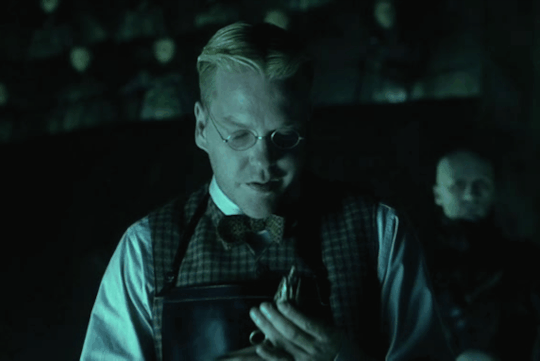
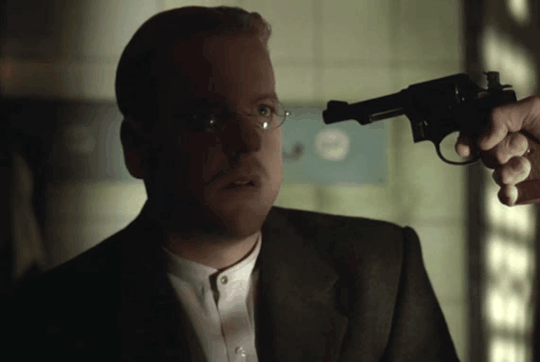
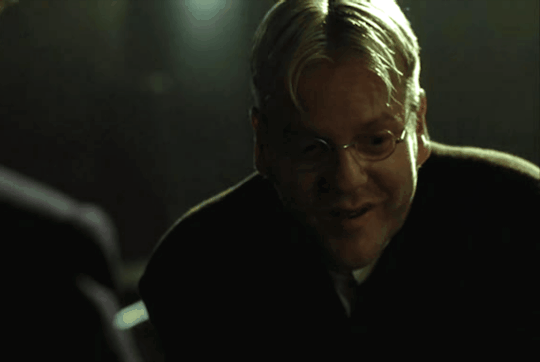

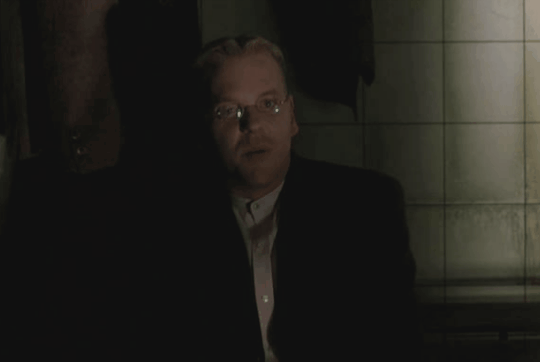
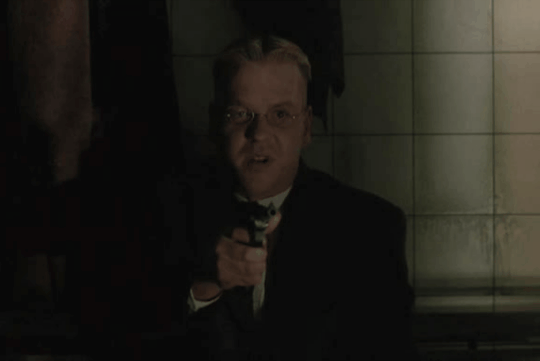
Kiefer Sutherland as Dr. Daniel Schreber in “Dark City” (1998)
//pt.4//
84 notes
·
View notes